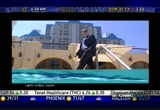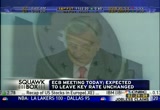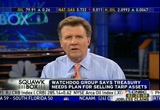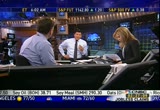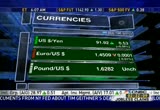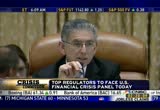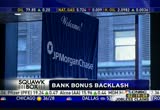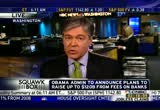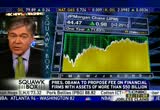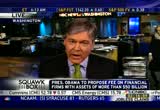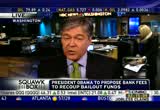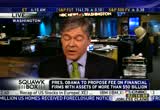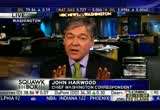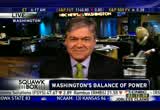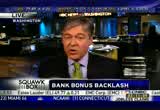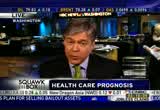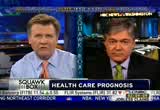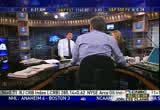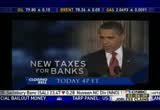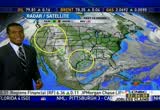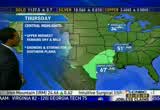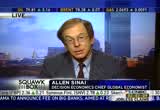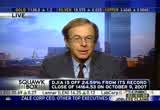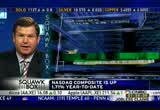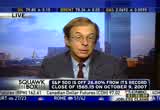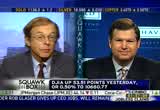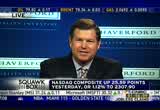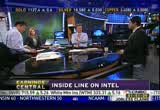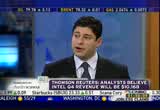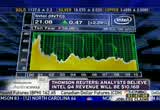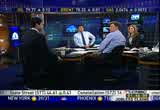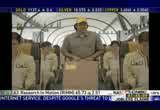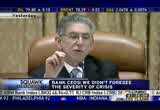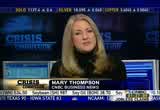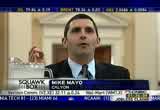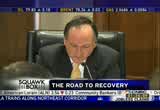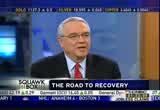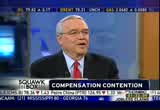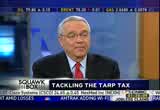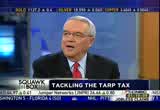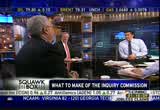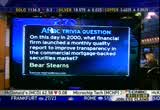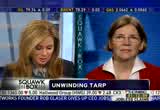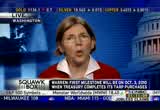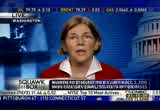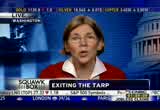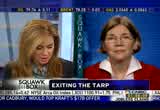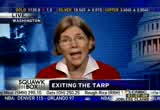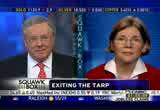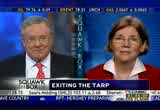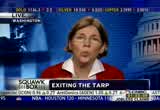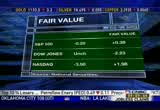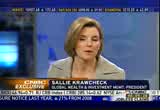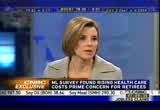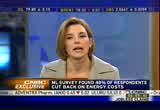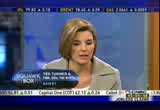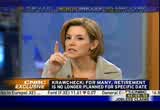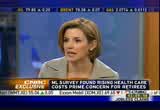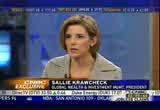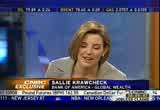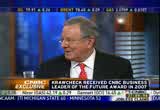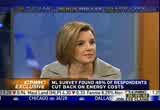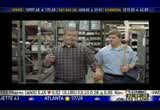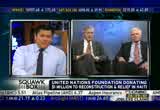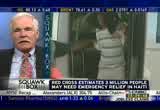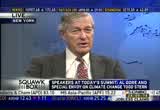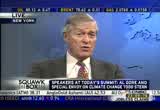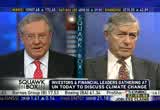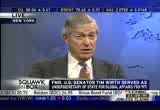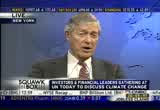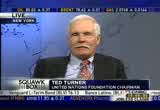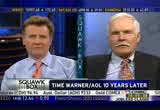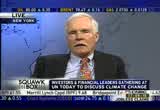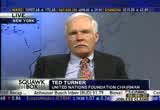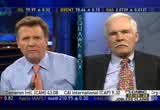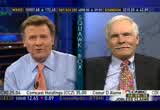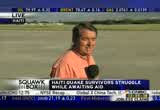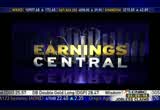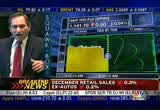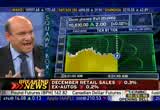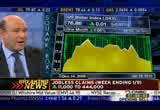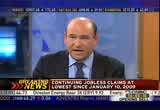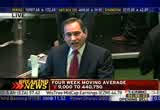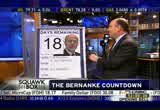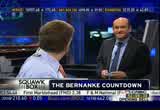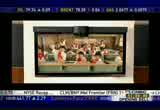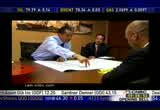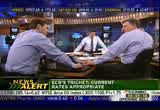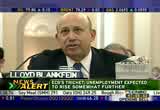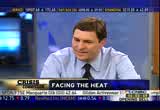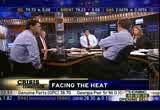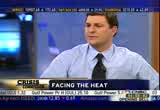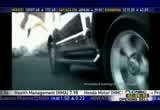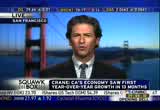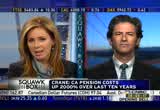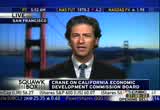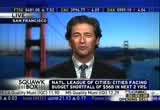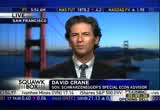tv Squawk Box CNBC January 14, 2010 6:00am-9:00am EST
6:01 am
good morning. it's the economy. key reads today on the consumer, employment and global trade. banker backlash, financial firms and their regulators on the hot seat in washington as "squawk box" begins right now. >> everything is context driven and i couldn't be more clear. after ten benign years in the context where we were, look, how would you look at the risk of a hurricane? that year after four hurricanes, everyone nerves were such, rates went up spectacularly. is the risk of four hurricanes any different? >> mr. blank fine, having sat on the hurricane board authority,
6:02 am
acts of god were exempt. these were acts of men and women. good morning, everybody. welcome to "squawk box" here on cnbc. i'm becky quick along with joe kernen and carl quintanilla. this morning, we have a trifecta of economic reports hitting the tape on our watch. weekly jobless claims, weekly retail sales and import prices dow at 8:30 eastern time. first time filings for unemployment benefits fell by 4,000 to 430,000 last week. continuing claims are forecast to have dropped by 179,000. retail sales last month are seen rising by 0.5%. look for that number to be up 0.3% when you strip out autos. finally, when we look for import prices, the consensus is calling for an increase of 0.1%. a did i say decision on rates from the ecb is due at about 2k8 45 eastern time.
6:03 am
pay attention to comments from jean-claude trichet. we'll see if he gives any more information on the plan to wean the banking sector. >> do you think we're going to be talking about greece a lot today? >> i keep thing about what bill miller said after the weekend, that these are after shocks, but not as dangerous as the earthquake itself. >> right, exactly. that is like on all of our minds. that is staggering. but this is what we do. we focus on stuff like this. a government watchdog agency arguing that the treasury department needs a plan for selling those t.a.r.p. assets.
6:04 am
this is the congressional oversight panel that we with talk about a lot, releasing its monthly report today. and there is no clear principle yet for getting rid of them. the panel says the treasury's plans are so vague that they're useless. a treasury spon spokesperson responds saying the geithner treasury has demonstrated a cautious transparent and disciplined approach in winding down the emergency programs, which is already yielding positive returns for taxpayers and the health of the economy. we happen we will have the chairman woman of the tavrp congressional oversight panel in the next hour, elizabeth warren will get on. we'll get it trade from the chair woman's mouth. how is that? you can't -- >> i think she is the chairman, i can't figure out why. >> yeah. she's a chairman, chair woman,
6:05 am
but she's not a horse. but straight from the horse's mouth. we want to get you the latest on what is happening in haiti. you've probably heard at least tens of thousands of people are now feared dead. we're beginning to hear estimates that involve six figures. michelle kosinski is on the phone with us. michelle, where are you and what can you tell us about what you've seen down there so far? >> we haven't even been able to get into haiti at this point. early on, those that were carrying aid were able to fly pretty easily into port-au-prince airport even there was no radio contact with the tower there. the planes that were able to land without talking to the tower were the ones that were able to get in. yesterday as the day wore on, especially late in the afternoon as we started to lose daylight, the air traffic around port-au-prince just became too great and air traffic control
6:06 am
decided that at that point, because there's not enough light to allow planes to land at night at this point, they said yesterday we have to get all of these planes out of here that have landed and every one that was in the air circling port-au-prince yesterday had to turn around and go back to where they came from. so we ended up flying over part you a prince with a flight plan and turned around in the air to go back. so we're trying to make another run to get into port-au-prince. but around us, there are a plane load of doctors turned around trying to get in. we saw one pilot complaining that he had embassy members on board trying to get to their people on the ground and could not. a lot of frustration at the airport and the staff there was trying to handle it and manage it as best they could. the problem is, you know, we know there's quite a bit of damage to the airport and port-au-prince. towers took a big hit. and we're seeing -- i guess it was tuesday night, the last
6:07 am
flight ought of heyty that landed in miami said they were surprised they were even able to take off at that point because they could see and feel the airport cracking around them. so we know there is a lot, you know, to be done there before there can be even somewhat steady flow of aid in and then planes coming out. we know that the u.s. was going to send air force employees to help with the traffic control. at first, the airport was just allowing aid workers in. a few more people were able to get in yesterday. and this morning, we're hearing, too, certain aid organizations are able to land. it's a difficult situation and we know some of the assets that are arriving, it's a tough job just to get them away from the airport and to people who need them, as well. it's pretty much expected to some extent. but when you have that kind of damage to the airport, the main airport, people are trying what they can to get there. >> and we're just talking about getting supplies on to the
6:08 am
tarmac, michelle. we're not getting to the point of getting those supplies on to the roads, often narrow and now blocked roads into these neighborhoods that have been destroyed. we're going to be talking about this for an awful long time. >> yeah. and we see that with hurricanes, too. haiti has been hit with three or four of them in the last couple of years that have been severe. it's frustrating for the people that have the help and who have collected that aid from people more than willing to send it there. and then to have it stuck at the airport for a very long time and sometimes even after the point that it's needed. heighty is a difficult place to navigate, sometimes on the best of days when you have bad roads and things like land slides and washouts. and we know the condition of roads getting away from the airport right now is pretty bad. a lot of rubble. people were describing to us even there being victims in the streets and having to move their way around those just to get the desperately need medical supplies out and around
6:09 am
port-au-prince. >> michelle, we know we'll be counting on you to bring us the stories and the pictures throughout the week in the days to come. i appreciate the phone call today. argue thoughts are with all the people of that devastated community. we'll talk more about that as the morning goes pop in the meantime, despite all of this, we're going to cover some business news here, on 10860 on the dow. got some of our losses back in asia overnight. we're going to be waiting for intel tonight and jpmorgan getting things going on a friday tomorrow morning, 24 hours from now. oil has been down three days straight. managed to get a little bit back. people looking at short covering, but still below $80 a barrel. the 10-year note i haven't seen so far this morning. we've got some auctions going on this week. 3.769% is the yield. we've got estimates on the year to come. dollar relatively steady, a
6:10 am
little bit on the losing side. we mentioned the concerns over the greek sovereign debt and the euro. and then gold, which is up seven of the last nine sessions and gaining a little more today. up to $1138.20. >> 7 out of 9 sessions? >> yeah. i think for the year-to-date, it's a positive. let's get overseas. christine tan is in singapore this morning with an update on what happened. >> asia. christine, good morning. >> good morning, carl. markets rebounded today pushing the concerns about monetary tightening in china. the nikkei rallied to a 15-month closing high. tech stocks led the way higher on hopes that the technology xhievent in gentleman pap will expand. core machinery orders tumbled to a record low. while japan's recovery looks
6:11 am
fragile, over in australia, it's a different picture. we had strong jobs data, rising the prospects of a rate hike in fed, sending the aussie dollar higher. led, of course, by the miners. china is make up for gains yesterday. the shanghai composite surging 1.4%. however, in hong kong, not being able to shake off those tightening concerns in china, down 0.2%. banks, developers still under selling pressure. let me wrap it up and, becky, let me send it back to you. >> thanks, christine. we appreciate it. in washington, senior u.s. regulators will be on the hot seat facing the financial crisis inquiry commission. fdic's sheila bair, mary schapiro will be among those testifying. today's session follows yesterday's heated session with
6:12 am
the bankers. >> i'm going to be blent with you. it sounds to me a little bit like selling a car with faulty brakes and buying an insurance policy on the buyer of those cars. it doesn't seem to me that that is a practice that inspires confidence in the market. i'm talking about betting -- >> every here is an institution, probably professional own investors dedicated, in most cases, to this business. >> representing pension function behalf the life savings -- >> these are the professional investors who wouldn't this exposure. >> the bank bonuses are also in the spotlight this week. this is an annual event when wall street announces employee take homes. this could be one of the largest and most controversial announcements ever. the "new york times" reports that goldman sachs is expected to pay its employees an average of about $595,000 apiece.
6:13 am
jp morgan chase's investment bankers are said to be on track to collect $463,000 on average and it comes at a time when you're watching a lot of americans hurt, unemployment above 10%. >> the president is going to announce plans today to raise up to $125 billion in fees on banking firms. john harwood joins us from washington this morning with a roundup of all these headlines. we're beginning to get fresh headlines on who is going to be targeted by this fee, john. a minimum of ten yeefs for banks that was more than 50 million in assets, including banks that got t.a.r.p. and those that didn't get t.a.r.p. that's just to start. your thoughts on that and the fireworks we saw on the hill yesterday. >> well, if there's good news for those who don't like the level of taxation that's been contemplated, the administration suggests that the ultimate cost of t.a.r.p. to the taxpayer is only going to be about $90 billion which is what they
6:14 am
projected this tax will raise. although it was continue until they resolve those liabilities. look, the administration needs money. they have pledged to make the take payer whole. i think bonuses and combination on wall treat, it's with a levee that raises some money and restores, reaccumulates some of the money that's been lost through aig, through the auto companies, even if the banks that are being targeted, and some of them will, will have paid back their money to the federal government. >> we're going to get jpmorgan's earnings tomorrow morning and they're expected to be about three times of the depths of the timing in '08. is the timing of this coincidence dental? >> no. it's also budget season and this administration is under pressure in a difficult election year, carl, to show some progress on
6:15 am
reducing the long-term budget deficit. you know, the spending issue, the deficit issue is part and parcel with the issue of government overreach, which critics have leveed against the administration. and one way to answer that is to say look at what we're doing to bring down this long-term deficit. >> it's going to hit investment banks more than banks that rely heavily on deposits. >> yes. >> i'm guessing because banks get taxed on that money, right? >> yes. the idea of this tax is to hit the broker dealer functions of financial institutions, not the depository functions. there's a way to counter the argument that what you're doing is going to inhibit lending because they're lending based on deposits and this is a way to go
6:16 am
around that or go to the side and not let the bank said, hey, wait a minute, you can't let us pay more money because we're not going to let you. >> jan, you're going to hear, though, but it adds to the charges of government oversight when you start using the tax code to actually punish bad actors. you heard that from jamie dimon yesterday. so it's going to raise the level of rhetoric from people throwing those bombs at the administration. >> yes, joe. people who are opposed to higher taxation will make those arguments. >> in a time when, you know, 10% is a nominal number. you really look and it's like 17%. >> yes. i think the argument you're going to hear from the administration -- and by the way, i'm going to be interview b treasury secretary geithner later today, this afternoon, and we'll be talking about this subject. but i think the argument you're going to hear is that the economy, while the job market is weak, is in a much stronger
6:17 am
footing and that this is not going to be debilitating to the economy. and, you know, there's a value judgment that anybody can apply to a piece of taxation. is it punishment or is it a way too raise money? and that's a value jump. i heard jamie dimon yesterday. >> any nothing in your niend this puts republicans in a box. if they come out with the tax, with the fee, eej paint them as being this the name crowd of banks. >> yes. both of those are good arguments. but the republicans are entering this election year in a strong position. it's the democrats who are on the offensive. this is something the democrats hope will cure some measure of their problems. but republicans are kind of riding a wave right now with
6:18 am
public discontent and that's to the benefit of the party and their elections. >> john, this is going to be interesting on tuesday, too. i keep seeing more and more articles showing up. the latest is in the "new york times" on the fronts page about this cokely. she's gone negative now. she had to. normally you wouldn't even have to mention the other guy. there are some people that say that the momentum is really with this guy. i mean, is that possible? what handicap is that? >> is it possible that he's going to win the election? >> yeah. >> democrats are worried about it. >> but it's not possible. i saw it written yet yesterday that they've already won. they're going to lose but they've already won because they've made et a race. >> i've heard that argument, yes. republicans, anytime they can take a very blue seat and show democrats as being on the run, that is energizing for that party. we'll see. there's nervousness on the dkic
6:19 am
environment. if scott brown is able to win out with that race, that will be an indication -- >> if the environment was so bad -- >> well, the president has other stuffed to right now. >> that's true. >> and others are saying he doesn't want to get up there because he doesn't want to be shown as -- >> but a lot of other republicans haven't shown up for brown, either. >> i think, carl, as you're alluding to, everybody is feeling this out saying, wait a minute, are you serious? can a republican really win this seat? and that creates caution and the judgment. >> new jersey is pretty blue. virginia wasn't at blue and that wasn't even close. >> interesting. interesting swing. >> i don't know what you're talking about. we don't swing in my neighborhood. >> blue to red, depending on the -- >> well, some people would say -- >> joe, i hear you're a pretty big swinger.
6:20 am
>> as in too swing. >> yeah, i wish swik a government 3w4rug, but not very mu mu much. >> john, yesterday, barney frank brought up this idea, these conversation committee hearings he's going to hold i guess on the 22nd. does that do anything to put the bankers on notice before they put these numbers out, tomorrow with jpmorgan and next week with some of the other banks? look out? >> yeah. do they need any more notice? will this change anything, do you think? >> well, becky, i think we're seeing in what goldman is doing, what bank of america is doing some sign that these bank executives are conscious, they're listening, they're reading the newspaper, they're getting the idea that they're
6:21 am
behind the eight ball in terms of public opinion. they're trying to react. but of course, they have to balance the interest of their people and their need to keep talent which is the argument that they've been making. so yes, i think they are on notice and they ought to be on notice, given the nature of this election year that they're going to be in the spotlight not just this month or next month, but throughout 2010. >> where does health care stand, john? there are a lot of things going on, but we're not hearing anything. >> this is not a joint statement. >> this is very interesting, guys. they had an eight-hour meeting at the white house yesterday. now, everybody has been assuming this thing was going to kind of float along for the month and get done at the end of the month. but you could see yesterday the determination of the president and the democratic leaders to really make some progress. they were not doing some of the contentious issues, abortion, immigration, but they were honing in on issues like the employer mandate and the pay force. what do you do about -- and this is, by the way, very relevant to
6:22 am
our viewers. the house, as you know, has put in their bill a 5.4% surtax on incomes above $500,000 for individuals, $1 million for couples. that is not going to survive the final product. but then the question is, how do you replace that revenue? one of the ways to do that, which is being talked about, is extending the medicare payroll tax, not just extending the tax, but extending it to investment income. what that would allow you to do, you could lose the surtax that i mentioned. you could reduce the level or the impact of that cat cadillac tax on high cost insurance plans, which is very important to labor unions chor opposed to that tax even though the white house is for it. >> the house doesn't want to be a wall nflower. they only won by 1 in the house. don't think we're going to roll over for everything you tell us
6:23 am
to do in the senate. i and i just wonder whether that starts getting louder. >> i've heard that argument from weinor and others. the house doesn't want to completely get rolled, but they're going to mostly get rolled. >> because they're the -- what is it in london? they're the commoners, i guess. >> they're in steerage on the titanic. >> they're not the senators -- >> john kerry, those types. >> we've modified. >> they're scrappers. >> it's sort ooh like on this show, joe is the house of representatives and becky and carl is the senate. >> becky is -- >> that's it! >> that's right. we have a picture of her, right? >> oh, yeah, we did do that picture. >> yeah. we did do a picture with you as the chief executive. that's right. all right. thanks, john. a lot of interesting things. >> so much going on. you heard the stories about they would be meeting with health care in one room, going to another to get updates on heyty, back and forth.
6:24 am
humanitarian crisis, a big state race. >> all the bankers down there just, well, we were thing that if things did go down, we wanted to be protected. those guys are like mice. >> i didn't think they were as mousy yesterday as they've been at some of the comingal hearings in the past. >> that looked pretty defensive, didn't they? >> you sat in that chair. you know they're like two feet taller. that is sort of what you look like when you're sitting before them. >> it's bad, isn't it? >> quick break in and out, today's national forecast when we return. lime jimmy stewart, right? first, though, a look at yesterday's winners and loserses. what are you doing...? calling chase sapphire, seeing if we have enough points to stay longer.
6:25 am
now? you don't have enough time... and you have to push all those buttons... no buttons, someone answers every time. yeah, right... bet you a massage... yeah, ok. hi, julie... i have a question about my points. hi, what button do i press for a massage? hello? new chase sapphire... you call. we answer. no waiting. just press right here... go to chase.com/sapphire. chase what matters.
6:27 am
welcome back. relatively stable pictures for futures this morning. got some action this morning in asia. intel coming tonight and later on this morning, retail sales and jobless claims. scott williams is at the weather channel with your travel forecast this morning. >> good morning, carl. as we keep tabs on the forecast from coast to coast, several areas we're watching as we move west of the continental divide, especially into the four
6:28 am
corners, watching for snowfall. salt lake city eventually into denver outside of alba kirksy, north carolina. meanwhile in the south mines, watching for moisture around corpus christi, into houston, and watching the weather conditions as we move into haiti. it will be warm and humid. for heyty, over the next several days, you can see good news. thursday, friday and into your weekend forecast, as well, that will be illustrated over on this 300 for us this morning and we'll show you that forecast momentarily. but continuing to see quiet conditions as we move into the northeast, just cool conditions to start. here is the forecast as we move into heighty here. upper 80s, lower 90s. so certainly, the dry weather is good news. boston, for today, 3 3 degrees for your high. tampa, it's much improved after seeing all the cold conditions
6:29 am
late last week. rain for you in corpus christi. minneapolis, 34 degrees. a chance for snow as we move on later on. san francisco, 55 will be your high temperature. as far as some airports that we're keeping tabs on throughout the day today, we'll be watching, especially in the lonestar state for moderate delays. so call ahead and check with your carrier. moderate delays as we move into seattle, as well. not expecting weather delays as we move into chicago. now back to you, becky. >> scott, we appreciate it. joining us this morning is allan sinai, also hank smith chief investment officer of hatherford investments. let's talk about the key markets today. >> we're going to see some pluses for nonfarm payroll in the coming months. we're going to have to take out the senus effect worker as we go along. it's going to be a jobless
6:30 am
recovery just like we had before the last episodes after the jounl turns. >> the senus effect, how do you possibly measure that or quantify that? is it any numbers that come in that are better than expected? >> the bls will tell us what the hiring is and we will be able to x that identity. and you don't see any of that in the claims, in the continuing claims data that we get today in the census effect. but it's already showing up a little bit in some of the data. but we'll see it in a big way in march, april and may when we'll get hefty nonfarm payroll number owes out because of that. >> the spending component looked more disk than others expected. >> labor is costly. we're going to have an upturn.
6:31 am
and business has to make profits for shareholder value. that's the montra of american business. with that driving you, you just don't want to hire costly labor. and gee, there's so many alternatives to labor. you can outsource to technology. it's just not in the business. it's like the banks, with you give them money, they won't lend a top credit environment. corporations are cash rich. their profits are terrific. the stock market is doing great. >> but they're still afraid? >> they're not going to want to hire. >> hank, if that's true, if this is a jobless recovery, does that kick the legs out of the stock market at this point? >> we don't think so. there's every reason to be bullish, even today after a 70% rise. the fundamentals are in place and the psychology is in mace, as well. fundamentally, you have growth. you have a profits recovery. you have a gdp recovery and it's just not domestic. it's a synchronized global recovery. and that is accelerating.
6:32 am
and if allen is right, and to some extent he may be right, it argues that we're going to be in a low inflationary environment. >> although, hank, if you're talking about unemployment continuing above 10% once we get to election time in november, which we've had some economists tell us they think that's going to be the case pb if you have that case, we keep saying that's bad news for the democrats because you're going to have a restless pop laying who is angry about the fact that they stilt don't have jobs. why wouldn't that be reflected in the stock market, at well? >> i think what weaver going to see is the pendulum will shift towards the center. so a lot of the draconian measures that the market views as draconian aren't going to
6:33 am
come to fru ig. and again, the market view that positively. >> allen, i guess there is an argument to be made that if unemployment remains my, the fed is not going to reign back in on this monetary easing. what do you think this eventually means? >> we have this paradox. high unemployment and that means the fed keeps interest rates at zero. that's a plus for the stock market. high unemployment, the companies that aren't hiring aren't going to hire that much. that keeps costs down, that helps profits. so the risk is that consumers don't spend enough and, you know, they're going on spend enough. that's actually, as odd as it sounds, the joblessness is a plus for the stock market. >> why is that? explain that again. >> well, you know, in the old days, the report we had last friday would have been very negative because it would have suggested that consumers sut back on spending because of a allowsy jobs market.
6:34 am
because of the interest rates are high, the feds will likely keep rates close to zero for a long, long time. that's a plus for stocks. stocks are all about earnings and interest rates, not about real gdp. earnings and interest rates. and keeping costs down by not hiring helps earnings. >> so you're saying, basically, the markets are in the hands of the fed, plain and simple, pretty much? >> the fed is in the hands of a lousy jobs market and keeping interest rates low helps keep inflation low and that is supportive of the stocks. there's no alternative to stocks as an asset class, so the money there's there and it's bullish with stocks. later on this year, there will be a big question about how the big scene goes, becky, to your question and which way that will
6:35 am
be handled. right now, washington is punitive to wall street. that's not good for stocks. if we move towards the center after the election, it will be viewed as positive from the stock market point of view. >> hank, where do you think the leadership is going to be, let's say over the next three to six months for the stock market? >> sure. one of our themes is cyclical to predictable. a consensus forecast is for a below average recovery and expansion. we are in that consensus. and if that is the case, you've had a great prun off the bottom in the more economically sensitive areas, like basic industry, industrials, financials, and many of the steady eddie predictable consumer staple health care companies have not participated. and so we see a shift towards those companies, like a disney, like a procter & gamble, like a johnson and johnson, mcdonald's,
6:36 am
ibm, walmart. these companies have seen great growth in their business in terms of earnings and dividends over the past ten years and their stock prices really haven't moved at all. and that is where the value is today. >> hank, allen, gentlemen, thank you very much. >> thank you. coming up this morning, we'll get the stop top stories and the inside line inn tell. "squawk box" continues in just a moment. host: could switching to 15% or more on car insurance? host: does charlie daniels play a mean fiddle?
6:37 am
6:38 am
6:39 am
6:40 am
that is up 21% from to 2008 and up from 120% from 20307. >> china is showing no gain of getting ground on censorship after they threatened to pull out of the company. >> and global -- and global shipments of pc surging in the fourth quarter. industry tracker idc reports that global shipments jumped 15.2% remains the market leader. it continued to increase its market share last quarter. tech bellwether intel is going to report fourth quarter results after the bell. let's gets the inside line on intel. i don't know if everybody remembers, you guys remember that huge quarter that they reported, right? craig berger is from ncf capital markets. they had a big quarter that everybody greeted with a lot of fanfare and wow, this is the best thing i've ever seen for intel. the stock hasn't seen the level
6:41 am
that it traded that day since then. but still at 21 and that's right where it was. why? is that forecasting not as good a quarter this time around? >> so intel had great results and i think they're probably going to do it again after the market closes. the guidance will be rebust. there's conceptism about the sustainability of earnings power. i'm bullish on this sector. it is going to take maybe another quarter or two for investors to say hey, this is sustainable. the company can continue to make a lot of profits. >> i'm trying to remember how the company beat the last time. it was either consumer or business. it was a surprise that the pc demand from one or the other was more than people thought. >> consumers have been robust in
6:42 am
2009. so what we're looking for is for that consumer strength to hand off to some enterprise strength. >> they raised one of the bullish things last quarter was they had raised the revenue range, right, so that the point went up. do you remember what it was? >> well, basically, they did raise guidance in q3 and then they came in and beat that. and the company is seeing particular strength in gross margins. >> margins, too, we'll be watching. >> for the fourth quarter, they guided a 62% plus or minus. for the first quarter, hopefully they can keep it at 60% plus or minus. >> when do they get to 100%. >> craig, we just heard from allen sinai saying corporations have all this money. they don't want to hire because they're afraid. that's probably what kept them doing some of the i.t. spending last year. have you seen signs that they're starting to loosen up when it
6:43 am
comes to tech spending? >> absolutely. it's all tied to capital budgets. and this capital budget says they're being refreshed and tech has this demand drivers. you have all these bits and bytes of data. so you have to see spending in order to keep up with the network capacity, editions and the likes. so as corporate budgets are refreshed here in 2010, i expect that to be a strong growth driver. >> what is the story with a market perform rating and a 33% higher target price? >> intel is a deep value company. i slapped a 15 times multiple target on the slot. >> why not make it a buy if you're at 33%? >> it does sport significant upside to target. >> what's your problem? why market perform? we're always assessing our target price. >> do you understand this? a 33% move -- >> it would be immaterial to
6:44 am
speculate. >> what do you have buys on? >> texas instruments, in deep value company. >> what's your target there? >> it's about $33. and another one that i like is marvl, which we've been pushing all year. >> is that less of a move? the move in texas instruments could be less than the 33% move anyone tell. >> we're always looking at our ratings and price targets on an ongoing basis. >> the reason i'm trying to figure this out, craig, is what would it take for intel to move through 25 on its way to 27? because it's stuck here at 21 and it looks so boring. it can barely stay at 25. >> one of the problems was you had this big windows 7 launch in october and there was a big build ahead before that. so investors were concerned there would be an inventory glut related to that windows 7. we've had good sell through in christmas, so-and-so i think investors are getting more positive on intel and on the space. >> you could see on that
6:45 am
three-month or six-month charge that it hit 21 the last time they had the big number. there was a lot of reason for optimism. they raised guidance. and this entire quarter has been unable to go back to 21 new now. >> we're digesting right now. >> if earnings power is sustainable, you have to think the stock is going to head towards 24, 25, sometime in the first half of the year. >> and tech itself is probably going to stand out through the whole market? >> request absolutely. i'm extremely bullish. we've seen revenues come back and recover almost all the way. what i'm seeing on the chip firms and they're stealthily starting to rehire people. they're adding people back slowly. they're not making announcements on it. that means we're in an early cyclical. that is a canary in the coal mine for the rest of the economies as we move through 2010 here. >> thank you, craig. we'll see you cheng back next quarter, maybe. >> you got it.
6:46 am
>> all right. it has to be.above 21 right then. 63% larger. you know what? there's a lot of shares outstanding. >> they're doing fantastic. >> they are? okay. good. but i have a market perform. >> if you have any questions or comments about anything you see here on squawk, e-mail us squawk@cnbc.com. right now 1.2 million people are on sprint mobile broadband. 31 are streaming a sales conference from the road. 154 are tracking shipments on a train. 33 are iming on a ferry. and 1300 are secretly checking email on vacation.
6:47 am
that's happening now. america's most dependable 3g network. bringing you the first and only wireless 4g network. right now get a free 3g/4g device for your laptop. sprint. the now network. deaf, hard-of-hearing and people with speech disabilities access www.sprintrelay.com. ow get a free 3g/4g device for your laptop. sir? finding everything okay? i work for a different insurance company. my auto policy's just getting a little too expensive. with progressive, you get the "name your price" option, so we build a policy to fit your budget. wow! the price gun. ♪ ah! wish we had this. we'd just tell people what to pay. yeah, we're the only ones that do. i love your insurance! bill? tom? hey! it's an office party! the freedom to name your price. only from progressive. call or click today.
6:50 am
welcome back. we're awaiting economic detail this morning. in the meantime, futures are in range. la branch is selling its market maker big to barclay's. the price tag, about $25 million. t it's expected to be completed bid tend of the month. >> they're a marketmaker for berkshire. >> james mcguire, a lot of people we've had on for years come from that branch. >> l.a.b., right? >> yes. >> let's get a check on the world outside the world of business. monica novotny joins us this morning with a roundup of the headlines. hey there, monica. >> good morning, guys. words like destruction and disaster obviously don't even begin to cover what is an unimaginable scene in haiti.
6:51 am
international aid teams, they're arriving now. that is good news. tinter national media has arrived, as well. no official estimate on the death toll, though heyty's president said it could be in the thousands. we'll continue to watch that in the coming days. meanwhile, president obama and democratic leaderers say they've moved forward on the health care overhaul. a group of 15 attorneys general are now threatening to sue over a controversial subsidy in the senate version that would reportedly bring $100 million in new medicaid exemptions from nebraska. it was included in the bill to win the support of senator ben nelson. here in manhattan, at 9 1/2 food feet wide, take a look at that, that building was built in the mid 1800s in an alleyway. it is manhattan's skinniest hat. $2.1 million. now, the seller bought it back in 2000 for $1.6 million.
6:52 am
not a bad profit. i think they listed it around $277 million, but the final selling priet was $2.1 million. but it has a historic significance. it's on bedford street in the village. it says margaret meade lived there and there are rumors that carry grant and johncarye grant lived there as well. >> you say carye grant lived there. they didn't live there at the same time in. >> no. >> they weren't together. nothing wrong with that. >> there's nothing wrong with that. >> no, there's not -- i think howard hughes was supposedly with archibold. snookie, thank you. can we call you that? >> i say -- >> just like snoookie has trouble -- >> i did grow up in new jersey, but that's where the similarities end, i hope.
6:53 am
>> monica, thank you. we'll see you tomorrow. if you have any comments or questions about anything you see on "squawk," e-mail us at squawk@cnbc.com. we'll be right back. but first, check out the "squawk" boardroom. it's a favorite hangout among the best and brightest billionaires and the most powerful market movers. today's headliner, guest host steve forbes speaks out straight ahead. national car rental knows i'm picky.
6:55 am
6:57 am
futures in a pretty tight range as earnings season kicks up again tonight, beginning with intel's number. before that, we get jobless claims in a couple hours' time. turning the tables, first the bankers, today financial regulateders on the hot seat. we'll get the latest from washington. here it comes! television's most exciting business cell of fabulous investment prizes. steve forbes, come on down, you're the next guest host on the "squawk is right."
7:01 am
banks and bonuses under the microscope. ceos fighting back and speaking to cnbc. >> we've seen a lot of people make a lot of money and leave and take, after the fact, the company went down the tube and hurt the american economy. that makes me angry, too. we're on washington watch. the crisis inquiry commission gets ready for another day of questioning. plus, one of the most influential women on wall street if an exclusive interview. bank of america salary krawcheck, we'll get her take on big bonuses and the company's latest quarterly survey. plus, guest host steve forbes, what he thinks about wall street's bonus situation and much more as the second hour of "squawk box" begins right now.
7:02 am
good morning, welcome back to "squawk box." we know you've been with us since 6:00, hopefully. i'm joe kernen a long with becky quick and carl quintanilla. a busy morning ahead. take a look at the rundown. sally krawcheck with an interview you cannot afford to miss. t.a.r.p. oversight committee chair will be here to talk about unwinding the t.a.r.p. program. she always says a lot of stuff about wall street, insendaries. i would say steve forbes might not agree with everything -- >> you never know. steve has an open mind. >> he does have an open mine. he's here. plus, stocks to watch as we await earnings from intel this afternoon and then jpmorgan chase tomorrow morning. the names you need to watch ahead of the bell. first, though, -- i hate when i have to say this, but first -- >> you hate having to toss to me? >> no, i hate becky has a look at the top headlines. >> we do.
7:03 am
when you take a look at the future, after yesterday's market gains, right now those dow sitting up about four points above fair value. at this point, not a lot of movement. don't forget, the jobless claims coming up at 8:30. wall street executives say they underestimated the severity of the 2008 financial crisis and apologized for risky behavior and poor decision. they defended their bonus and compensation practices to a skeptical commission investigating what caused that collapse. >> throughout the financial crisis, we ever posted a quarterly loss. we served as a safe haven for depositors, worked closely with the federal government and remained an active lender. >> it's going to take a log lot of work and due difficult agali remove the safety net but i'm convinced that will happen. >> talking about an asset here is an institution, probably professional only investors dedicated, in most cases, to this business. >> representing pension funds
7:04 am
who have the life savings of police officers -- >> these are the professional investors who want this exposure. >> the financial crisis inquiry commission, those hearings will continue today. senior regulators will get their turn to speak as well, including fdic chair sheila bair and mary schapiro. united states and other nations are sending food, water and medical supplies to assist the western hemisphere's poorest nation. president barack obama promises an all-out humanitarian effort including the military and civilian emergency teams from across the united states, but conditions there are very difficult and a lot of that aid is having a hard time finding its way through to the villages that are most in need. meantime, billions in bonuses set to be doled out to wall streeters over the next month, and bank of america is the latest to de-emphasize cash and bonus payments. mary thompson joins us with more. >> bank of america is changing up its payouts.
7:05 am
the bank saying it wants to allow compensation more in line with shareholder interest. the wall street firms may be trying to deflect public interest in what's expected to be a near record bonus season on wall street. the changes? some say employees will see upfront cash bonuses cut to 5% of their total bonus. last year b of a employees received 50%. on average, junior bankers will get 25% of their bonus in upfront cash. senior bankers, 5% to 15% in immediate cash payout. the rest of the money will come to deferred stock and payouts died to bank of america's stock. details are still being worked out. still news of less cash and more stock may not sit well from the public who heard from the financial crisis inquiry yesterday that wall street pay was a big factor in the mnl meltdown. here's analyst mike mayo. >> i think one word after all these months going through this,
7:06 am
one word will come up as being a key cause and that one word is incentives. people do what their incented to do. >> with the financial crisis just a year behind us, people on wall street are still being well incented. through the first nine months, jpmorgan, morgan stanley setting aside $36 billion to pay employees. the average bonus at goldman will be $595,000, $463,000 at jpmorgan's investment bank. to some those payouts easily justified given the billions in profits expected from both firms. it could be a tougher sell for bank of america where bonuses are seen close to 2007 levels and citi where the pool is expected to be $3.5 billion. keep in mind, wall street pay is historically been linked to revenue, not profit. that's a hard concept for the general public to grasp says the public feels many would have had less of both without taxpayer
7:07 am
assistance. >> lots of fireworks on capitol hill today. more to come. the president out with details on his plan for a so-called t.a.r.p. tax on banks. our guest host this morning, steve forbes, president and ceo of forbes and author of "how capitalism will save us" and leo hendry, former senior economic policy adviser to the edwards campaign, joins us back at the table. good to see you again. >> good to be here. >> good to see you. >> your take on the hearings yesterday. >> predictable fireworks, especially in election year, politicians are trying to deflect the role they played in this disaster and the federal reserve's key role in this disaster. they'll focus on easy things like bonuses. the real cause of the crisis, which they have not focused on, which ben ber fan i can will wash his hands of, is the federal reserve printing too much money. if it had not printed that money you couldn't have had a bubble. the last time the fed printed money, back in the 1970s it went into oil and to the farming
7:08 am
sector. when it prints too much money it will flow and have disastrous m imimpacts? >> do you think greenspan and bernanke should have been called? >> they were the root cause, and then fannie and freddie, those two entities, the junk entities and s.e.c. and fasbi for mark to market. we couldn't have had the meltdown without mark to market meltdown. >> i hear from people on the street say if fannie and freddie are not front and center, then they don't take it seriously at all. >> we don't know bottom line fannie and freddie -- i would say some exception to steve. i think this compensation issue, which mary led with in the earlier segment, you can't ignore it. it's the spark that lit the flame. we just have to look at the compensation schemes. $36 billion coming from three firms here in the next few days.
7:09 am
? bonuses. there's no incentive in that structure, carl, to rein it in. sure, there was too much credit. we all have to acknowledge that. i think steve is right. but the fundamentals of the system are broken. we incent people to take risk when they fail at their risk-taking we bail them out. it's the too big to fail problem as well. >> can compensation, though, be allowed to proceed the way it was if things -- if other fire walls are hired? if regulator is less lax? if there's more transparency? if leveraged is capped? things like that. >> we're not going to see that. we are a year into the remedies, and we've seen nothing that is a fundamental sfix of this system >> we hope we see financial reform bills? >> we hope we do. when you go after these people,
7:10 am
the lobbyists come after you in untold fashion and fury. so, you know, the proof will be in the pudding. the only measure for me is to whether we're successful, is whether we also rein in compensation practices here as well. >> steve, is that -- is compensation a red herring or does it need to be handled? >> you cannot reform. the bottom line is if the dollar was stable you couldn't have had the trading you had in currencies and commodities. you wouldn't have had that instability. in terms of a too big too fail, that has to be addressed one way or the other. you cannot have a firm put on the side and said, you cannot fail. you have to have special provisions in the bankruptcy code in terms of a financial institution. those are the things they should be concentrating on instead of just railing -- it's easy, railing against compensation. doesn't get to what they used to call root causes. >> how about the t.a.r.p. tax? it's going to -- it's not going to affect all banks the same way, right? >> right. so they say, well, we'll only go
7:11 am
after investment banks, blah, blah, that's not going to hurt the economy. any tax will hurt the economy. again, it ignores -- taxes are not going to dig us out of this hole. aset appreciation will dig us out of this hole, and reforming medicaid and medicare and not the government takeover of such. >> there's nobility in the agenda. that's to capture the $120 billion that's -- that we're estimating we're going to lose from the t.a.r.p. the problem with the proposal is it doesn't discriminate. you cannot go after that $120 billion with a wide broom and believe you're doing the right thing. where we get the $120 billion back? probably. will we get it from the right people? probably not. and that's the problem. i mean, it's not even behavioral. it's just a one-time tax that has a very narrow agenda, $120 billion. that's fine. but, again, the wrong institutions will -- a lot of the wrong institutions will pay it. a lot of people took t.a.r.p. monies that didn't want to.
7:12 am
a lot of banks went through this crisis well managed and have no role to play in this outcome, in my opinion. and so, it's appropriate agenda. it's a very inappropriate process. >> it's buckshot, in a way. a lot of the banks that rely heavily on deposits were heavily involved in what went wrong but they'll get exonerated, to some degree, because they're busy paying fees on deposits. >> when the details came out this morning, late last evening, it was befudling, buzz it is unclover. okay agenda. very unclever application. >> you don't have a problem with big compensation, big paychecks? >> well, i don't at all. >> in general. it's the way the incentives are lined up? >> yes. you have to measure the outcome with the risk. i mean, what we've been doing for years is paying people, and then they get to do an autopsy, that really didn't work out quite like i thought. and i still have my billion dollars of compensation. there has to be complete linkage
7:13 am
between the compensation and the eventual outcome. and as steve said, no more of this too big to fail. the whole incentive of behavior is completely different when you know you're covered. >> and one of the things if they ever bring in the great greenspan s to ask him about that 1998 bailout of long-term capital. that set the precedent, that set the moral hazard that is going to intervene if you get in trouble. so no surprise. leverage goes up. the leveraging that took place could not have happened if the fed hadn't printed the money for it. >> right. odds on that happening, on him being called? >> may eventually call him but they don't know how to question him. they had him 18 years as the fed and they didn't know how to have oversight and they still don't have real oversight over it. >> last word on the commission. do you think it's an exercise in humiliation for these executives
7:14 am
or are they going to get to the bottom of something? >> these are able people but not alone in this endeavor. we've been looking at these issues for a year. i doubt we don't know what went wrong here. we know what went wrong here. one more commission that has a one-year time frame is probably not what i would have sought. i think we know what to do it. just do it. chris dodd, steve will argue with what chris is trying to do, but chris at reece has a plan out there. now let's start debating it. let the nation look at it and see what to do. another commission who won't give us a report for a year, it doesn't do much for me. >> the bottom line is, even if those reforms that the administration and mr. dodd had proposed had been put in place ten years ago, we still would have had a disaster given what the fed did, mark to market accounting. the firms that went under had positive cash flows. if you had that 20 years ago you would have had the same result the last time we had a banking crisis. >> good to see you again. >> thank you. >> leo hendry and steve here for
7:15 am
the next couple of hours. any comments or questions, we'd love to hear from you this morning. our address is squawk@cnbc.com. when we come back, bonus buzz on the hill, talk of a t.a.r.p. tax from the president, we'll speak to elizabeth warren about her plans to unwind the t.a.r.p. program, or lack thereof. stay tuned. she's one of the world's most powerful women, running sanford c. bernstein and later smith barney. named one of the top cfos in the country while at citigroup. and now she is running bank of america's global wealth and investment management division. a special interview with sallie krawcheck is coming your way. on this day in 2000, what financial firm launched a monthly quality report to improve transparency in the commercial mortgage-backed
7:16 am
securities market? this is not pay the hospital insurance. this is not pay the doctor insurance. this is not major medical insurance. this is affordable-we-pay-cash -directly-to-you- fast-when-you're-sick -or-hurt-insurance. if all you know about us is... aflac! ...then you don't know quack. to find out all the ways aflac's got you covered, visit knowquack.com
7:18 am
7:19 am
the answer, bear stearns. there's the answer to the trivia question. futures have not moved around a whole lot despite swirling clouds around the market, commissions in d.c., earnings season kicking into second quarter. intel will be the focus as investors await the after the bell earnings number. intel thanks to posted gain. the report will be a key driver for the markets tomorrow along with numbers from jpmorgan chase. you'll be seeing those right here on "squawk" tomorrow morning. meantime the congressional oversight out with its latest report on the t.a.r.p. program and how the government is planning its exit. joining us is elizabeth warren, chairman of the congressional oversight panel and a law professor at harvard university. miss chairman, thank you for being here. >> good to be here. >> this time you're focusing on how the treasury exits the t.a.r.p. and there are a lot of
7:20 am
important questions that come from that. maybe not the least of which is how do you ever get out of this idea, this implicit guarantee, that the treasury stands behind the banks? i don't know how that's even possible. >> that is the big question. you know, there may have been a notion before october of 2008 that the really big boys could count on some extra help from the government if there was a problem. long-term capital management had told us that, bear stearns had told us that. after october of 2008 when the government said, in effect, we will throw as many taxpayers as it takes under the bus so that you can keep right on rolling, when all that money gets paid back, which looks like where we're headed, that promise still hangs in the air. and, you know, so much so -- have you seen, for example, the ratings on citi? one of the rating agencies says explicitly we give it a rating of at "a" because we know there
7:21 am
are government guarantees here. if not, we give it a rating of "bb." the notion is the big boys will be safe no matter what. that's dangerous. >> short of aallowing a major bank to fail, how does the government shake that notion? >> well, the bottom line is, it really is going to take a change in the rules. and so this business of regulatory reform that's grinding through congress, passed house and now sit in the senate is where this will come down. we talk in the congressional oversight panel's report, there are a lot of different approaches you could use. you could say, for example, we're going to break up the big ones. we're not going to let anybody be that big. you could say we're going to regulate them more, tax them more, prohibit them from engaging in certain actives. that was the idea behind glass steegle. or take the approach to say, at the end, we're just going to really have a way to be able to kill them off. amend the bankruptcy laws, create something called
7:22 am
resolution authority so that we can credibly say to any large financial institution, hey, if you screw this up badly enough, you really can be liquidated. your shareholders wiped out, top managers fired. >> one of the -- no, i'm sorry. >> no, no. i was going to say, until that day comes, until we can credibly say that, then this economy remains at risk. it remains an economy that is distorted by a guarantee those large financial institutions benefit from but don't pay for. >> one of your major criticisms you've brought up against the treasury, at least in this report, is that the treasury's goals for t.a.r.p. have been so broad it's difficult to come up with any sort of metric to say whether it's achieving those goals or not. >> that's right. so, one of the things you have to remember, we've been banging on treasury for over a year now. saying, you've got to articulate what the principles are behind these programs, what it is you're trying to accomplish,
7:23 am
like any business. you've got to have a goal at the end that we can measure against and tell whether or not you've accomplished that goal. whether or not you've succeeded. so to their credit, with this report, treasury is finally said, okay, here are our goals for disposing of the assets that we're going to continue to hold once the t.a.r.p. program has wound down. how we're going to deal with this $100 billion. the problem is, what they've articulated, we're going to sell them off in a way that preserves the stability of the economy, preserves individual institutions and maximizes return to the taxpayer. you know, that's pretty general stuff. by giving three different things that are probably in any specific situation in conflict with each other, it means that one can say they always win. if you say, hey, you didn't maximize shareholder value, say, that's okay, we were working on
7:24 am
preserving this company. >> treasury has a statement they gave us on this. one way of measuring it is looking at the cost of the program to taxpayers. they say, their stewardship has shown measurable progress. they say, remember the last february t.a.r.p. was estimated to cost more than $500 billion. in august that estimate fell to $340 billion. now we're estimating the cost to be around $116 billion and this trend might continue. is that something they should receive kudos for? >> absolutely. look f we loes less money under t.a.r.p., two thumbs up. god bless. i hope we reach a point with this program where it breaks even. that would be terrific. the point is, at the end of the day, when t.a.r.p. is over, it's not really over. treasury will still be holding more than $100 billion in assets. that has a real impact on the market. more importantly, where we started this conversation, the implicit guarantee is now huge. and it distorts every other business activity. every small bank, for example,
7:25 am
that's out there, competing for capital, against a big bank, is doing it. the small bank has no implicit guarantee. the big bank is sitting on an implicit guarantee. this affects the cost of funds. this effects the rickiness of the decision you undertake and the business plan pentagon. this affects the entire market. it's not treasury's fault. this is what happened when we entered into t.a.r.p. and this is what we have to wind back out of. that's what this month's report is about. >> ms. warren, it seems like any time you have a bank that is a certain size that presents a systematic risk, the government has no choice but to back it. that seems like a given. so either you -- we need to break up the big banks, that's one option, or is it possible to have an orderly winddown that wouldn't be a systematic failure? can we keep them big with an orderly winddown? what makes more sense to do? >> i'm going to start by saying i don't think it's an either/or.
7:26 am
i think you can do a little of both. that is, you can make them smaller, make it more expensive to be a large financial institution. after all, if you're getting this guarantee in effect from the government, why shouldn't you pay for it through higher taxes or more regulation? but we really need to beef up. at the end of the day, it's going to be about a credible liquidation system, a credible way to say in bankruptcy, if you make bad enough decisions, you end up in a place where your shareholders are wiped out, top management is fired. if we can't credibly say that to these financial institutions, they own us. we don't own them. >> it's not capitalism if you can't -- >> that's right. >> ms. warren, steve forbes here. one of the things about the flexibility of t.a.r.p. is that, at least i think until october this year, they can still make commitments to a fare-the-well. is there anything to stop them from doing anything they want
7:27 am
including bailing out states, maybe the kansas city royals in baseball or something? there seems to be no parameters on the thing. >> we think there are some limitations and we try to run a pretty tight oversight here. but it is the case, you are right to point out that up until october 3rd of this year, they can develop new programs and they can continue to spend money consistent with the original legislation. and keep in mind, even after october 3rd, they can actually continue to still spend money under t.a.r.p. as long as it's under a program that was established before october 3rd. and the money was already committed before october 3rd. in other words, it's not going to be the case on october 4th we're going to say, well, that's over, turn out the light and we can put that whole t.a.r.p. episode behind us. >> would you recommend that congress now put in severe limitations? after all, this thing was passed in a panic.
7:28 am
the original purpose was t.a.r.p. was of toxic assets. that was quickly ditched. looks like a lot of this, the reason why they can't follow the money, as you point out in your report, was they did this on the fly. they still seem to be doing some of it on the fly. shun we just say enough, over, now? >> fair enough. the question of whether or not congress wants to do something different with t.a.r.p., obviously, is up to congress. i work for congress. we are the congressional oversight panel. but i will say this, one important part of our report here, is to make it very clear to treasury that if they're going to start a new program, the way we put it is, let's learn from the mistakes of the past. we underline exactly that point. that the money went out the door with no strings attached. as a result, frankly, the american taxpayer will never know how the banks used that money. what really happened to it. and that if they're planning any new program to put any more money out the door, it's got to be with strings attached and
7:29 am
with some real accountability for where that money goes. otherwise, if you think our last reports were unpleasant, wait to see what's coming next. >> congressman -- not congressman. as you were talking about congress. chairman warren, we appreciate it. come back next month and tell us about the next one, too, okay? >> good. i will. still to come, the interview of the hour, she oversees one of the largest wealth management businesses in the world with more than $1.9 trillion in client assets, bank of america's sallie krawcheck, president of the global wealth and investment management division of that firm joins us.
7:33 am
futures a little in the narrow range as we await the second leg of earnings season kicking off tonight with intel after the bell. checking the dollar, amid warnings of a dollar crisis, former congressional budget office rudolph penner says that will happen unless the u.s. raises taxes or cuts government spending to reduce debt. number of foreclosed homes shattered records in 2009. realty track says 2 million foreclosure notices were sent out last year. apartment va kency rate fell as incentives from landlords attracted new ten ans, according from city habitats. any comments or questions, we invite to you send us an e-mail. our address is squawk@cnbc.com. before we go to break, we'll be getting a phoner now from brian williams, as you may know, and if you saw "nightly news" he's in port-au-prince.
7:34 am
we saw you on the tarmac and got an immediate sense of how difficult it is to get a picture out of there. what's the situation this morning? >> well, carl, it sounds so interesting to hear about upcoming intel earnings after the bell tonight when we're down here in a nation where people mostly spent the night in the dirt. those at the airport slept out here on the cement tarmac because of the aftershocks. as you know, haiti is a nation where they struggle to provide basic human services on a good day. on an average day. and they've gone from very little to nothing. the new estimate is that 3 million people were in the quake zone. the earth rattles, kind of rolls a little bit every certain period of time. they are still triaging what they have. they are still finding people. and there are people who,
7:35 am
wherever they are, that has now become their grave. i don't know that we will ever have a proper death estimate here just because of how life and death are so closely separated in haiti. now, the relief effort is starting. we just had an aircraft full of french civil authorities unload relief. small planes are coming in, large planes, some coming in with personnel, some with one or two palates of medical aid. some coming in economy to take people out nation by nation. we watched the canadians come in last night and take 100 of their own out of here. they're coming in with three more aircraft this morning. so it's early yet here. this airport is soon going to be the biggest hub in this part of the world. and then the effort will be all the palates, all the materials, how do we get that to those who need it. >> brian, there have been a lot
7:36 am
of questions people have been wondering, trying to figure out what they can do as well. we hear about the problem trying to get the aid from the airport there and beyond. what's the recommendation from people on the ground to people here who want to help? >> reporter: you know what, our website, nightly.msnbc@nightly news had our producers go through and make as best we could a good list, a compilation of as many of the reputible agencies as we could, i'm sure the red cross, catholic charities is big here. but americans can help the way they usually do. and just, you know, to hear -- waking up this morning that a text messaging campaign back in the states raised $1 million in an eyelash, is very familiar. i have to tell you, when you're down here and you see a c130
7:37 am
that arrives that says united states of america on the side, we have a canadian producer who saw the canadian c130 arrive, a finland air aircraft came in last night, the fairfax county virginia fire rescue team built -- they beat many nations to this scene last night. it's a great thing. because there's no shortage of work. and there's no shortage of need for folks who can give a few dollars. >> it sounds like there's just still a very difficult time trying to quantify the damage that's there, trying to figure out what's happening. is there a better sense with daylight today or is this still going to take us quite a while to figure out the problems and how extensive it is? >> reporter: boy, when i looked down on this place by air yesterday, it's -- it's really unbelievable. you see what our are pockets of fresh rubble, bits of rubble and
7:38 am
dust and they have groups around them and you know it's a makeshift excavation. then you see people generically in the streets. they don't want to go near any of these structures. we sat down for a moment late last night under an overhang at the airport and a man came running over to us. there are huge structural cracks. just the airport, the tower looks blown out like towers i've seen in afghanistan and iraq. the glass is gone. there's no air traffic control. cracks in the walls, standing water in the international airport on the floor. that's just one building. at least it's still standing but i'm sure it will be condemned. and on and on and on. and the usual pockets that make no sense. a building standing next to a pile of rubble. no building codes to speak of over the last several years. long term, let's hope they get some rebar down here for the construction, some real engineering firms, maybe, just maybe, the world can get
7:39 am
together on a reconstruction plan for haiti that will make haiti and haitians feel better about themselves. >> before we let you go, i wonder, you've been witness to some disasters firsthand in banda aceh, new orleans, now this. is there a way -- i know it's still early days, but is there a way to compare what we're going to see in the days to come to what we saw in natural disasters like that? >> reporter: in some of this, carl, to be perfectly blunt about it, you won't see a lot of the victims because they're gone. where they died will end up being where they died. but last night, i'm here with the producer who accompanied me in banda aceh and i ran into another producer who was there to cover the same story. and he reminded me of the kind of foreboegd, whding, when you out you're going to see something indescribable, you have to find a way to process
7:40 am
because it doesn't match the rest of life. you'll find nothing else to compare it to. so it's that kind of a feeling. yes, portions of katrina, though minus the outrage that the response was so badly botched, just the inequity of it all, and a lot of banda aceh will probably seem familiar, even though most of those deaths were the result of a tsunami that took the lives of so many, as not the initial earthquake as is the case here. >> look forward to seeing you on "nightly news," brian williams in port-au-prince. redcross dog, doctorswithoutborders.org, oxfamamerica.org,le is vagsaermusa.org, a lot of playings you can help. that's why i book with expedia. so i can find someplace familiar... or somewhere more distinctive...
7:41 am
7:43 am
our next guest, one of the most well-known names on wall street. she joins us to unveil the results of the merrill lynch quarterly influence, sallie krawcheck, bank of america global wealth and investment management. you've got the thundering herd now to talk to about what their clients are saying, so that's a good place to go to find out how affluent people are feeling. what did the survey show us? >> i think there are a few surprises in the survey. one of which is that affluent people are feeling better. affluent people who were putting off their retirement bit are
7:44 am
putting it off a bit less. they're thinking about retirement differently. we on wall street talk about retirement in numbers, how much you need to save, what you need to invest and to get there. and affluent investors talking to us back that numbers are important but half of them say, if i could do it again, i would focus more on what i'm going to do and how i'm going to do it, not just the number, but how i'm going to spend my time. which i think is actually a pretty important message for wall street and for the wealth management industry. where we define risk as standard deviation and they define risk is, what if i can't live the way i want to. >> is that different since everything fell apart or is that something -- >> i think things are a bit different. the entire -- certainly the industry, but our clients as well, have been through a pretty difficult and scarring downturn. what we're finding, is that people are saying, yep, my retirement, before it was numbers, numbers, numbers.
7:45 am
and today it's a quality of life issue. so people have and are changing how they're thinking about retirement, but what they could do differently now is that you think about that quality of life. people are -- as they've gone through the downturn, they're cutting back. what we're finding is that they are cutting back on luxuries, to spend more time with families, and they are, you'll be happy to hear given the story we saw before, they're cutting back on luxuries twice as much as they are cutting back on giving to chartable institutions. >> we have people who are bullish the market come in and say that the common investor will get tired of holding cash at zero percent and move into equitie equities. more who are more cautious say 2010 will be a year of capital preservation than innovation. where are we leaning? >> one's a market call. we as an institution are feeling okay about the economy. you know, we're seeing a pretty good recovery as occurring, not
7:46 am
a zooming recovery but an okay recovery. i think you can see a pretty good market. and what we're fining is that the clients are still at historically high cash levels but beginning to move into the market. but as a group, you know, we're giving them advice that, don't think about just moving into the market in the typical way. right? which is invest in the s&p but think more broadly about it. our clients tend to and the client of the industry tend to be underweight the market overseas where there's so much growth. if the last downturn is any indication, less volatility and a combination of less growth and more volatility for people to have a home bias, which is stay within investing in the united states because i know it can be a real portfolio mistake for them. >> do you find that -- do you find concern about the value of the dollar? that getting them to look more overseas or hedge their bets a little bit? >> it is seen in some class as a black swan.
7:47 am
what if something terrible happens to the dollar? what folks don't fully recognize that as an ip vesting group they're overweight the dollar and they don't know it because they don't recognize it until they travel to a market, a market overseas, go to shop and say, gee, my money doesn't buy as much as it used to. that may not be as big an problem for those that travel overseas as much but the next generation, away from the dollar may be a real risk. >> inflation, is that making them think more about long-term bonds? is it still a very short-term orientation? >> people still want to stay safe. what you see are investors who are a bit older are more concerned about inflation. why? because they remember it. those who are younger are less concerned about inflation but they interestingly our research shows the younger investors are more risk-averse than older investors. those in their 20s and 30s are more risk-averse than those in
7:48 am
the 50s and 60s -- >> because they've gotten burned. >> burned twice. what are the most experiences you have? your first and last experience. that's what you remember. if they came in the market, got burned, more recently got burned, you know, they really will have a problem saving for retirement. what the retirees in our survey and our research are telling them is work with an adviser, work with an adviser earlier. one of the things retirees wish they had done is start working with an adviser earlier and think about it so you don't have to catch-up at the end. >> did the survey give investors any opportunity to register any type of populous discontent with wall street? >> that's a very interesting question. what you see amongst vinnesters, certainly overall, is wall street, given what's going on, that makes me feel nervous. but what you see -- and i think this is contrary to what you might expect -- is that 85% of the investors in our survey were happy with their financial
7:49 am
adviser. 85%. as i said, wish they had started working with the adviser earlier. so they're seeing -- they're talking to their adviser more. than they were before the downturn. they're seeing real value in that adviser. that's what we see at merrill lynch, a u.s. trust. the clients value that relationship. despite, again, it's not what you would expect from the headlines. >> it might not show up in a survey of affluent people as much as it would with people who aren't affluent. i'm wondering if there's a certain percentage of the public that says, look, wall street, you know, you can just take wall street and just shove it right up -- you know, i'm never going back into the market again. i'm not going to try to help these guys, pay conditions to these guys, i'm not going to be involved with wall street and that could keep investor out of wall street, for a while. sooner or later -- >> i think you see that in the demographics. for the younger folks feeling more risk-averse because of those experiences. gee, i had a couple and they weren't good or i haven't had
7:50 am
any experiences with wall street except what i see on tv or read in the paper or some friend of mine. for the ones moving through their life, in their 40s, 50s, 60s, who have had that experience, yes, i see it in the newspaper but i'm dealing with my adviser. i'm dealing with my adviser face to face. i've had a -- not a good experience every day the last couple of years. boy, they were tough. my adviser kept calling me and working with me. those are the folks that are coming back. an issue we may face as an industry, as a country, those advisers are so nerve racked that they don't ever get into the market. they are the depression-era babies, so to speak, then we'll have the fiscal issues we look at in the united states get worse over time. >> sallie, competition, brands have been damaged in this crisis. what -- do you see that among your customers? is there a person they go to, not the fact it's merrill or b of a, you?
7:51 am
how do you build loyalty again to the brand? >> the loyalty to the brand is is happening through the advisers. yes, again, for what the view is out theout there versus what is actually happening. you know, my expectation going, if you told me -- if you had perfectly forecast the downturn, i would have guessed the client of the wall street firms would have fled and gone to the iras, gotten away from the big ugly wall street banks. what has happened instead is clients have stayed. they stayed buzz of tecause of relationship and the value from their adviser. and they stayed because, let's be honest, having a strong financial institution backing them and their adviser is not such a bad thing, whereas for the rias whereas they're independent, the registered investment advisers, whereas they're independent, that has a nice ring to it -- bernie madoff was an ria. gee, that backing is not such a
7:52 am
bad thing. >> we've read that -- you're talking the customers. we've read that the rias have fled many of the big firms to go and start their own shop or go to smaller firms. >> yeah. >> has it happened? merrill is one they talk about. >> be careful with that because what i see -- i see a lot of articles about it, which to my mind the biggest problem you make in forecasting is it's easy to extrapolate a trend. some continue to go. among the largest advisers, the largest producers, those folks are staying with the wall street firms. why? again, that safety and security. two, the brand names have taken a hit but are still strong. you know, three, very importantly, again, i read all of the merrill financial advisers, u.s. trust advisers are going, our attrition rate in the fourth quarter was at a record low. at a record low. so to some he can tent you had folks who were going to go and upset about what was happening
7:53 am
and what happened. in other instances we're seeing that with that safety and stability and with the additional capabilities that a bank of america can bring to the merrill advisers and the u.s. trust advisers, they're still in their same offices, still have the same managers, able to do what they do. there are no quotas, so they're able to serve their clients. with the combination of that, despite i read about these big attrition rates, it's not happening and they're not going to the rias in droves. >> can i ask you some personal things? >> what's your favorite color? >> i don't know. >> you don't have to answer. barbara walters, i mean, ten most intriguing people. you're close. for wall street, you're one of the most intriguing people. last time you were on you didn't have a job. >> i know. >> and now you have a job. >> it's so great. >> you used to be -- you were on the cover of the last -- best analyst. now you're not an analyst. you're an adviser. why did you decide to take this job versus other jobs? were there other offers? what is your job now at merrill?
7:54 am
>> whatever i do, there's a lot of it. what do you -- you know, why did i take the job? it actually wasn't a difficult choice at all. in fact, the last time i was here i think i showed up on the job about a week and a half later. >> you think it was your appearance here that garnered all the activity, all the interest from the different firms? >> joe, i don't think that. i know that. but, you know, i did not believe it -- believe it or not i did not begin speaking to bank of america until after i was on the show. i did -- i did do something related but not that. the honest to goodness truth is, when i heard from the company and looked around and i built my career in wealth management, there is no better wealth management firm out there. >> those two firms together -- >> u.s. trust and merrill lynch -- >> in better times it would have been a dream merger. >> i think in these times it's a dream merger. >> sallie, one of the things that happened in the crisis, the dollar became a default position, have you seen what
7:55 am
would sound counterintuitive, overseas client saying, well, this is safe even though they've been battered? >> sure. you are seeing clients continue to ask about the dollar and they ask about gold, right? one of the requests we're having from clients is how can i hold physical gold with you? >> not an etf? >> not -- yes in etf and also physical gold. >> in my house. >> in your office, right, yes. >> but do you find that people overseas, who you like as client, coming and saying, hey, we want the safety of the u.s. or u.s.-based firms? >> it is absolutely happening. despite the fact weweakening of still the store of strength and the largest economy in the world. for all its hiccups, a well-functioning compaeconomy. >> when you joined, did you have any hope or thought that maybe you could get moynihan the job he finally got? was there any possibility of
7:56 am
that? >> we worked on that, too, didn't we? >> did you work on that one? >> yeah. >> well, let me tell you, i'm glad brian has the job. know, of course, in this day and age, people come into these roles and you get all kind of chitchat. this is an extremely hard-working man who knows this company. and i think the shareholders should be very pleased. >> they say they need an outsider. he is an outsider. he's a fleet guy. >> he's had experiences in different firms and has been at the organization for long enough to know the organization very well. and what's important is the strategy we're putting in place in wealth management, again to bring these capabilities to clients, he feels very good about. >> how did you think he did yesterday? >> i think he did great. >> sallie, a lot of our headlines -- >> very good. excellent. >> right over the plate. >> -- tend to come out of washington. we're watching what's happening there every day, between the hearings going on, what's coming from the administration, from treasury. all of the noise and all of the potential changes that could come from washington, how does that make your job more
7:57 am
difficult? >> well, we need to manage through it. and i think we need to embrace the fact that, you know, action is being taken on the regulatory front because, clearly, the industry went through massive convulsions. it's not -- it's not -- forget, it's not good for the industry. it's not good for the investors. and so for this process to be occurring, in what we hope is a lagging indicator of where the markets are and the economy are to go through and sift through what's happened, it's messy, it's tough, it's emotional for everyone to go through it but it's really a necessary part of the process and the healing process. so that we put in place the -- you're never going to stop every downturn from occurring, certainly. if you put in the safeguards that can make clients and investors feel good about getting back into markets. >> valerie jarrett has been on some of the talk shows this morning referencing the t.a.r.p. fee, although some say that's an incredible euphemism.
7:58 am
she says banks should step up to their responsibility and be our partners, not try to fight their obligations. we're not looking to pick a fight. we're just saying, make the taxpayers whole. others are saying, banks already pay their octiobligations when paid back t.a.r.p. is this complicating things? >> look, we were pleased to have the t.a.r.p. dollars and we were pleased to give a good return on the t.a.r.p. dollars to the american people. so as a company we'll continue to work with the administration, again, to get the industry to the right place. so that people can have the confidence in the industry that we need to really get the economy moving and the markets moving. >> sallie, we want to thank you very much for joining us today. >> thank you very much. glad to be here. >> sallie krawcheck. >> we should mention ecb, left rates unchanged. >> ecb, rates unchanged. that was expected. we'll keep an eye on that, too. when we come back, we'll give you the late owe the jobless claims report coming up in about 35 minutes' time. that report could spark some more interest in the market.
7:59 am
it's been something they've been watching closely. also, business and media icon coming up, ted turner, talking climate change with hundreds of corporate leaders at the u.n., but first he'll talk to us. keep it tuned. ♪ [ male announcer ] every business day, bank of america lends nearly $3 billion dollars to individuals, institutions, schools, organizations and businesses in every corner of the economy. ♪ america. growing stronger. every day. ♪ you know why i sell tools? tools are uncomplicated? nothing complicated about a pair of 10 inch hose clamp pliers. you know what's complicated? shipping. shipping's complicated.
8:00 am
not really. with priority mail flat rate boxes from the postal service shipping is easy. if it fits, it ships anywhere in the country for a low flat rate. that's not complicated. come on. how about...a handshake. alright. priority mail flat rate boxes only from the postal service. a simpler way to ship. st: could switching to geico 15% or more on car insurance?e you host: did the waltons take way too long to say goodnight? mom: g'night john boy. g'night mary ellen. mary ellen: g'night mama. g'night erin. elizabeth: g'night john boy. jim bob: g'night grandpa. elizabeth: g'night ben. jim bob:'night. elizabeth: g'night jim bob. jim bob: g'night everybody, grandpa: g'night everybody. jim bob: g'night daddy. vo: geico. 15 minutes could save you 15% or more.
8:02 am
the push for global climate change comes to america. trillions in capital meeting at the united nations today. business and media icon ted turner and former senator and head of the u.n. foundation tim wurth joins "squawk" for a special half hour. plus, ten years after the mega merger of time warner and aol -- >> this is going to be a much, much stronger company. >> ted turner shared the stage on that historic day. his reflex es on why it failed. we face a $19.9 billion deficit, $6.6 billion for the rest of this budget year and $13.3 billion for the upcoming budget year.
8:03 am
>> how about-l california get out of it's budget nightmare? the chief economic adviser david crane has some answers. "squawk box" begins right now. welcome back to "squawk box" here on cnbc. first in business worldwide. i'm joe kernen along with becky quick and carl quintanilla. our guest host this morning, steve forbes, president and ceo of forbes. he'll be with us for the next hour. we're counting down to the weekly jobless claims number and retail. both of those have become more important. both at 8:30 eastern. polled economists say first time unemployment benefits fell 4,000 to 430,000 last week and continuing claims are forecast to drop by 179,000. and the markets key off this number quite a bit. meantime, overall retail sales last month are seen rising half a percent, excluding autos. look for that number to be up 0.3%.
8:04 am
ahead of the numbers, the futures have been around the flat line. now back up. up about 16 points. if you were to look at the dow. the nasdaq, which has been stronger, unlike the s&p and the dow, is indicating a lower opening. we do have intel after the bell. let's get to becky with more headlines. >> bank bonuses are in the spotlight as wall street's biggest firms get set to announce employee payouts. . could be one of the largeest and most controversial payouts ever. bank of america plans to cut cash portion of bonuses. new york times is reporting goldman sachs is expected to pay employees about $950,000 apiece. jpmorgan is set to collect about $463,000 on average. stay tuned to the financial crisis commission's inquiry into what went wrong. senior u.s. regulators will object the hot seat today. got fdic chair sheila bair, eric holder and s.e.c. head mary
8:05 am
schapiro, among those testifying today. krnks will be covering this event all day long. relief efforts accelerating in haiti where tens of thousands are feared dead in the worst earthquake in two sentries. president obama has promised an all-out effort to provide aid needed. haitians have been sleeping in the streets while they wait for help to arrive and the damage has made it very difficult for those rescue efforts to get started. carl? >> thanks for that. the united nations foundation announcing it is donating $1 million to restruconstruction a relief efts. ted turner, chairman of the united nations foundation and the foundation's president, former u.s. senator tim werth, both at the u.n. where hundreds of investors and fj leaders from around the world are gathering to discuss climate change and the global economy. thank you for being on the program. >> good to be here. >> i hope you don't mind if we start with haiti and talk about, a, how quickly you think help
8:06 am
can get to the country and, b, if there is going to be some effort to provide infrastructure better than they had before. >> well, about the infrastructure, it's too early to tell, but obviously they have to rebuild port-au-prince. i'm sure they'll use earthquake-proof buildings wherever they can in the future. and aid is supposed to start arriving today by air, according to the news reports i saw this morning, that the airport there will be open this afternoon for relief flights. >> we know the u.n. itself has had to deal with tragedies in the first 24 hours. deaths among some staff, the mission chief, one of the victims. is there a sense that even if aid gets to the airport -- i know you're not on the ground, none of us can do anything but speculate -- but how easily do we think these goods can get to the people who need it? >> well, it will be challenging.
8:07 am
we'll just see as it unfolds. i don't think there's any way -- but there's a lot of rubble and rubbish blocking the roads. it's going to be -- it's going to be a real fire drill. >> yeah. we'll keep our eye on that. it's obviously an incredibly important story. let's switch, though, to the u.n. climate issue here, for. 400 to 500 investors, al goer, george soros, rich trumpka. what's the mission here and what do you hope to accomplish? >> this is the fourth u.n. summit, a nonprofit investor group have held at the u.n., we'll have about $7 trillion worth of invested money there, all focused on the issue of responsibility the investors to think about the issue and take into account the issue of climate change over a long period of time. there's no question about the fact there will be significant impacts on the value of investment portfolios coming from climate change, getting
8:08 am
investors to understand their analysis has to include that. increasingly we see very, very large institutions like deutsche bank deeply engaged in this. they've made that a part of their business plan. and ranging down to smaller entrepreneurial investors looking for opportunity in this as well. and really leading the pack as we shift our economy overall, as you know, to a low carbon economy. >> some people looking for opportunity might have been disappointed by the action in copenhagen, which seemed to devolve in its final hours into this dispute between us and the chinese. you think it was a success, right? >> i think overall it was -- you know, you've got heads of state to understand this, the chinese and the u.s. ultimately came together, president obama demonstrate the his just remarkable personal commitment to this, the chinese for the first time have made commitments on this front. you've got heads of state all over the world focusing on the great importance of this issue. getting these very large governmental institutions to focus on climate change and come
8:09 am
to understand it is extremely important because they're the ones that have to drive the changes of policy that are then going to introduce renewable energy, lots more energy conservation, forest conservation, and most important of all, for your listeners, this whole new area of climate finance, which is going to spread very rapidly. they're going to be hundreds and hundreds of billions of dollars invested year after year for a long period of time. so we have to understand what the new rules are going to be and we have to understand, you know, how we pool together private funding to meet these opportunities. >> senator, steve forbes here. in terms of priorities, the u.s. congress, it looks like, cap and trade is in very, very serious trouble, even though there is some atmospherics in copenhagen, nothing real was done. china is on the way to double output of carbon dioxide in the next decade. should there be a different approach, instead of talking about hundreds of billions,
8:10 am
maybe smarter investments if you think carbon dioxide is the villain? it's not going to go down in an preeshable way, certainly not in our lifetime. >> we have to start the pattern. i think copenhagen was a good first step, again, of focusing the world on this issue. will there be lot of new technologies? absolutely -- >> senator,en to interrupt. the world has been hearing about this for decades. we did a cover story on it 20 years ago, about global warming -- >> i know you did. >> and yet in the real world nothing has been done. >> i don't think that's true. >> that's all people talk about, not real progress has been made. >> steve, there's a lot more than what goes on in new york and washington. in the united states we've got 30-plus governors and states making very real commitments. about 500 cities have put this at the top of their agenda. there's activities all over the world. the chinese is changing their patterns remarkably. the indians are stepping up. we've got the momentum going in
8:11 am
the right direction. you know, what are the new institutions? i think you're asking the right question about what are the kind of institutions and the institutional change and the legal change. for example, just in the last week, indiana, certainly not known as a left wing or whatever state, just passed a fee in tariff which will encourage renewable energy into the power system of indiana. that's an example of what's going on all across the united states. everybody's -- >> what role -- >> everybody's acting except congress. >> what role do you see for nuclear power? >> there's a significant role for nuclear power, no question about it. and i know the legislation that looks like it may emerge from the effort of senator graham or republic, senator kerry, democrat, will include, of course, seeing if we can speed up the licensing for nuclear power, which is what ought to be done. the big issue on nuclear power, is finance and the long-term financial issues and how that compares to other investment opportunities. we've got to get the rules right
8:12 am
so people know we're moving toward a low carbon economy. >> mr. turner, working at a cable network, as we do here, obviously we get you on and we don't get you on much. gee, i don't know, you've got interest at some other cable networks, i know, but while we have you here, i've got to ask you if you saw that extraordinary moment we had with steve case and gerald levin on live? it was about a week and a half ago. i've seen you -- >> i saw it. >> you did see it. and i've seen you quoted that in the history of the world, that merger may have cost you more than, i think -- the only guy you came up with when microsoft went down, bill gates may have lost more than you -- >> there were several others but less than 10. >> $8 billion for you? >> from the high to the low. >> what did you think of these two guys and what they said that day? >> well, you know, i'm happy to
8:13 am
let that pass, just fade away and focus on the present and the future. >> let me ask you, then, about -- did you know that when you were starting cable, that it was going to -- i mean, the reason that comcast is buying nbc is for cable. i mean, did you know it was going to come to it point? it was going to be the most important media asset on the word? >> i didn't know it for sure but i thought and hoped so. and i worked to make it happen. >> i mean, i was thinking back on -- you're at the u.n. you pledged a lot of aid to the u.n. at one point your time warner stock, had you to re-evaluate how to make the grants to the u.n. based on the loss of value from that merger, so -- >> right. but i've done it. >> but you've done it, i understand that. but other than that, when mr. levin apologized for the worst deal of the -- i guess, in history, were you surprised? we don't usually get that time of admission, culpability?
8:14 am
>> i wasn't surprised but it was good of him to do. >> the resolution surrounding climate change, you've obviously put a lot of your own fortune into conservation and are you trying to make a profit off the world going green and how do you advise investors to follow you? >> i would like to. the government has to level the playing field. that's why this legislation is so important, because we're still subsidizing the coal and the oil industry in various ways. we should stop doing that and make sure, with fees or with cap and trade, that true cost of the pollution that comes from burning coal and oil, is covered by the users. and then, then solar and wind
8:15 am
power become very competitive. yes, i'd love to make some money with my solar investments i have. and i intend to. and i think a lot of other people will, too. what i'll do with the money is just give it away, but i'll chose who to give it to, like we did in the case of haiti yesterday. >> we've had some energy analysts, for example, come on the program and argue solar and wind and all of that is going to be good at some point in time, but nearer term, a good amount of money will be made on watching the dirty industries you referenced getting cleaner. is that not of interest to you? >> well, certainly. i'd love to see clean coal but i'm afraid it's not economically feasible. and coal is inherently dirty. it's 200 years old. it's time for us to move beyond coal and oil. you know, the oil problem, steve, is that $750 billion a
8:16 am
year that we're transferring over to countries that are not exactly our friends. it's really crazy. it's really dragging our economy down to take so much of our wealth and give it to people that aren't our friends. >> mr. turner, that's been a similar message we've heard from boone pickens. he's in the new york times today with a new ad campaign that focuses on natural gas. he thinks that's the way to go -- >> i think as an interim crossover fuel till we get solar, wind and bio, biofuels, i think that -- i'm a subscriber to the pickens plan. he's a good friend of mine. and i really think he's a great american and a great person. he's really right on top of it. >> ted, while we have you here, i think -- i get a chance to ask you these things and i have to do it. i know you love cnn, it's your baby. i know you're not involved in running it anymore, but when you look at the way fox news in ten
8:17 am
years has sort of risen above cnn in terms -- >> for -- >> ratings and profitability and other metrics, would you advise -- should cnn stay the course with the idea that it's just straight news or do they need to change with the times and become more opinion-based? >> i think they've got -- become plenty opinion-based. >> they've already become plenty opinion-based? >> i think so. i'd like to see more hard news there. >> you'd like to see even more hard news at cnn? >> yes. a little less tiger woods and a little more what's going on in the world. >> all right. well -- >> that's my own personal opinion. >> no, i know. you're allowed to talk about cnn, i can tell you that. >> i'd like to everywhere. i'm not a yellow journalist. i'm an old-line journalist. i like the new york times and "the wall street journal." >> well, i'm glad you mentioned them both because that covers
8:18 am
the gamut. >> and "squawk box." >> and "squawk box," which you said you were watching when levin and case were on. >> i watch them all. >> we appreciate that. we appreciate your time as well. >> our thanks to you, mr. turner, chairman of the u.n. foundation and former senatorer tim wirth, that conference getting under way. interesting stuff there. we covered a lot of ground. united nations going to be focusing very much on what's happening in haiti. let's get more on that situation and the efforts following the deadly quake there. nbc's kerry sanders is on the ground in haiti. what can you tell us? >> reporter: becky, the united nations is still trying to account for all its personnel. you can see over my shoulder here, there's a u.n. armored personnel carrier at the front of a plane that came in from brazil. the authorities from just about every country now are trying to do what they can to get aid to this country. we had a plane that was here just a short time ago in from cuba. they sent in a brigade of doctors, 70 doctors on the ground now trying to work out into the community. i'll take you around here at the
8:19 am
airport, which is going to be the one of the busiest airports in the caribbean for quite some time to come. a plane from france. off in the distance there was a plane from china. it looks like it now departed. another plane getting ready to depart. supplies are coming. as supplies are coming, that means that the aid will begin to get to the people. but, getting it to them will be the hard part. i'm going to look right up here. as we're talking, i see a helicopter coming in. i'm told the canadians will be flying in a c-17 today and on the nose of that plane there will be several helicopters. quite frankly, that's going to be needed to get much of the aid out beyond the concentrated areas of downtown. and the reason that's going to be required is because in some cases, the roads -- remember, roads here are not like you have in new york or in any city in america. roads here are poor to begin with. give you an example.
8:20 am
a very common thing for a child to do in haiti is to take dirt, fill a pothole, and then stand on the side of the road with their hand out. as the person comes by, give them a tip for filling that pothole because otherwise they wouldn't be able to get by. so you have the road structure here, which is limited at best. then you don't have all the checks that you need to get the supplies out. some of those trucks have made their way in from the dominican republic. remember, we're on the island of hispaniola, half is haiti, half is the dominican republic. they sent in a tremendous number of vehicles, over land, late last night, arriving. they're mobile kitchens. so they can begin to set up food for these people who are homeless. understand, just about everybody is homes. even if the structure is standing, folks don't want to go back inside out of fear that an aftershock will bring that building down. a lot of people sleeping on soccer fields in tents, sleeping in parks on the ground, just sleeping along street sides.
8:21 am
becky, the humanitarian misery here is horrible and fearful it's going to get even worse. >> kerry, is it your sense -- we hear the helicopter behind you. is it your sense that more of these planes will be able to land today to get things kicking off with relief effort? >> reporter: yeah. that's the good thing. a team from the air force in upstate florida, they arrived here and they've now set up a communications system. they've taken over providing the frequency control here so the planes can begin coming in. i asked the colonel in charge of that, what about -- because this airport's filled with people who are americans, french, just people who don't live here but were here in one form or another who want to get out, some injured, teenagers, students. what's the likelihood of the air service opening back up here, commercial air service? they believe it's possible maybe two to three days, american airlines jets will be landing here, getting them out.
8:22 am
>> kerry, thank you very much. kerry sanders, again, standing by in haiti. kerry, we'll hear more from you over the next few days about what's happening there. when we return, we'll have today's top stories. we're counting down to two big economic reports. we have the jobless claims and government retail sales data. stay right here. they find them at td ameritrade. trading's all about strategy. and strategy... is all about information. so i start my trading day... with td ameritrade's morning perspective. that's interesting... or, look at this... i can mine their weekly webcast for ideas. this is what i need. of course, ideas are just the start. so now i can drill down. heat mapping... heat mapping shows me where the money's moving. 2,500 stocks... one quick glance. cold... cold. hot! right there. look at this-- pattern matcher... pattern matcher spots technical patterns, automatically. wow, look at that. look at that head and shoulders right there. it's like pattern radar. pattern x-ray vision. plus, this amazing gadget... called the telephone. i can call td ameritrade anytime
8:23 am
8:25 am
22 minutes past the hour. we're counting down to the most up to date jobless claims number in seven minutes' time. the golden state of cries. david krin,crane will tell us h revive the california economy when we come back. as we go to break, check out the price of crude, below $80 but rebounding after three straight days of losses. what are you doing...? calling chase sapphire, seeing if we have enough points to stay longer. now? you don't have enough time... and you have to push all those buttons... no buttons, someone answers every time. yeah, right... bet you a massage... yeah, ok. hi, julie... i have a question about my points. hi, what button do i press for a massage? hello? new chase sapphire... you call. we answer. no waiting. just press right here... go to chase.com/sapphire. chase what matters.
8:26 am
it doesn't cover everything. and what it doesn't cover can cost you some money. that's why you should consider... an aarp medicare supplement insurance plan... insured by united healthcare insurance company. it can help cover some of what medicare doesn't... so you could save up to thousands of dollars... in out-of-pocket expenses. call now for this free information kit... and medicare guide. if you're turning 65 or you're already on medicare, you should know about this card; it's the only one of its kind... that carries the aarp name --
8:27 am
see if it's right for you. you choose your doctor. you choose your hospital. there are no networks and no referrals needed. help protect yourself from some of what medicare doesn't cover. save up to thousands of dollars... on potential out-of-pocket expenses... with an aarp medicare supplement insurance plan... insured by united healthcare insurance company. call now for your free information kit... and medicare guide and find out... how you could start saving.
8:28 am
let's take a look the dow futures. well above fair value -- well, at this point you're talking about up by close to 20 points above fair value. all of this could change in a moment. right after this, we'll get breaking news on the economy. retail sales and probably most importantly, the jobless claims report. we'll have that and much more. stick around. the number bes, the instant reaction. host: does charlie daniels play a mean fiddle? ♪ fiddle music charlie:hat's how you do it son. vo: geico. 15 minutes could save you 15% or more on car insurance.
8:31 am
welcome back. we're waiting a couple big numbers from the government this morning. first, take a look at target. it's up more than 1%, almost 2%. they are going to resume their open market purchase buy back plan. on tgt. >> on tgt, right. >> suspended back in november of 2008 when things were not looking so hot. that is back on track. it might have some affect on the stock later on today.
8:32 am
meantime, we are awaiting jobless claims, retail sales. rick santelli at the cme group in chicago. steve liesman and steve forbes are here in studio. a lot of numbers. consensus is 437. what's the number? >> the number is 444,000. there should be a lot of seasonalities with this early 2010 data. we we'll get to that later. revised 433,000 so up 11 sthou. if you look at continuing claims, they were slightly revised but hugged under 4.81 million. they dropped just under 4.6 million. of course, we know that we lost several million-plus from the labor force completely in 2009. and we want to talk about all the other categories. quickly, now, retail sales, down 0.3% on headlines, strip out autos. down 0.2%, take out autos and gas and it's down 0.3%. comes on the back of positive
8:33 am
revigs of november. import prices month over month is a goose egg. year over year, 8.6. now, 8.6 is, you know, over twice the rate we looked at last time. but it's right in line with expectations. and it underscores a variety of complicated crossborder issues with things like energy. preopening dow hugging early gains. interest rates a bit volatile amid huge record corporate and sovereign supply. retail sales disappointing. >> rick, don't go anywhere. want to get more reaction from steve liesman and steve forbes on set. >> real quick. i want to underscore what rick said about this time of year and seasonal just. every economist who writes a report right now says, this is what i think but what i'm looking for is huge volatility inside the number. the story here is there hasn't been as much volatility as you might expect. not a huge deal. the continuing claims coming
8:34 am
down. i would say be careful. the government's trying to estimate how much hiring and firing there is. it's trying to use last year's seasonal adjust many, which was a weird year. i don't think we get a true picture of the jobs situation until january and february -- >> sxen this the census kicking in. >> it really effects the numbers beginning in march. especially in april. that's been the story over the last three censuses that happened. it has a modest effect until march. i can get you a graphic on that. >> is that what dudley is talking about when he sees employment gains within a few months? >> let's hope not. >> he didn't say all -- >> his call on -- i mean, most economists, carl, are looking at the idea that we've pretty much gotten flat when it comes to payrolls minus 85, plus four with the last two we had had. most with temporary employment point to some gains in employment coming some time soon. some thought it might be december.
8:35 am
they were wrong. january, february, look to be possibilities. which is, by the way, why we're going to try to take next week's jobless claims numbers, roll it and have a look. we talked about the nfib story, you had larry lindsay on yesterday. current hiring has nothing to do with profit. if you look at the nfib survey, back to back, they go over each other and they don't core respond. the interesting gauge or thing that tells us whether or not there's going to be hiring has to do with expected future sales. that is the big one. if -- if small businesses believe the consumer will be coming in the door, they will hire now. and we've got ton a point where those show flat job growth, not positive numbers. >> they're not ready -- >> they're not sold. getting people sold on recovery -- you can take that idea and throw it across the spectrum. i was really interested in that target story. that may be a leading edge number, but we've talked about this number a lot. $820 billion of cash on the
8:36 am
books of the s&p nonfinancials. what does it take to get them to spend that money? goldman sachs with a piece this morning it could take money. >> the target number? >> the target buy back. >> i'm looking at the stock price. target is putting its buy back program back in place. when the stocks close to 50. when it put it off, stock was half the price. in november of 2008. maybe this was a saving, conserving cash in a panic moment type of move. maybe it tells you businesses are feeling a bit better about not needing the cash flow. >> people keep saying, yeah, they have cash, it's going to div, buy backs and m&a. >> steve forbes, he'll say it won't matter. those are all different sides of the same coin. >> yeah. companies want fortress balance sheets. one reason why we haven't seen a rigorous job recovery, which we
8:37 am
should have had, is precisely uncertainty. what is going to happen on taxes? what's going to happen on health care? we have a big tax bill cut expiring at the end of this year. so that uncertainty and with a weak dollar, hey, you can sit on your cash even though it's not earning much money. >> you were telling us yesterday that companies don't necessarily hire when sales are good, but when they think sales are going to be -- >> look, there's a secondary order of events can has to do with the thing steve is talking about, and i don't know -- we can argue are they secondary or primary. is it taxes, uncertainty over climate change and all the other things out there the administration has put on the table. the number one thing everybody would agree is future sales. if you can tell me what future sales are going to be, i could tell you how many people i need right now. >> rick, did i hear you agreeing with steve forbes? >> slulgs. absolutely. i've taken the train for 30 years and there's a lot of interesting conversations you hear on commuter trains.
8:38 am
the one common thing i hear constantly, whether it's the guy who owns the coffee shop or the shoe store, is that they don't kn know. they run pretty tight these small businesses that employ six to ten people. whether it's tax policies, changing or expiring, what health care will be, i'm not talking about the programs, whether i like them or not, but there's no doubt, at least from my part of the world, it impedes hiring. >> right. >> steve, you know, today is january 14th. we've been talking about this story all week long. there's a countdown on for ben bernanke right now. >> absolutely. we have a countdown. we got ahold of -- we did an fioa, freedom of information act on bernanke's desk right now. as of yesterday, 18 days remaining. on that day he was calling princeton about job openings, buying mortgages. he said, of course, call reid about scheduling a vote in the senate. our john harwood did.
8:39 am
he says, it's going to be scheduled. today's calendar, whereas of today there are 17 days remaining in bernanke's term. what's he doing? he's going to watch jb jb f"squ" for jobless claims. call reid about the vote and he plays basketball with the staff. he's got that scheduled for 4:00. all other things being equal. that's our daley bernanke term countdown calendar we'll do every day. >> is he point guard? what does he play? >> i don't know. i know he has to go every now and then, he goes and he does a basketball every now and then with the staff. >> that's true, huh? >> joe, that's economic humor. >> i know. i got it. as it goes it wasn't bad. >> got the smile, the chuckle. not ready for leno. >> the bar's very low, believe me. so you're a leno man? >> when i -- but i can't stay up, as you know. fy were. >> people are taking sides. i'm just interested -- you just said leno.
8:40 am
you didn't say conan. >> conan hasn't done it for me. >> hasn't done it for you? >> even though i'm in the demo. >> conan has too much hair for you. >> that's another reason i dislike him. >> thank you. getting to the bottom of the financial crisis, the bankers were on the hot seat, now the industry will be under more scrutiny as they hand out bonuses. more on the crisis commission from david faber next, who will be on "squawk box." i think he's still down in d.c. hi, ellen! hi, ellen! hi, ellen! hi, ellen! we're going on a field trip to china! wow. [ chuckles ] when i was a kid, we -- we would just go to the -- the farm. [ cow moos ] [ laughter ] no, seriously, where are you guys going? ni hao! ni hao! ni hao! ni hao! ni hao! ni hao! ni hao! ni hao! ni hao! ni hao! ni hao! ni hao! [ female announcer ] the new classroom.
8:41 am
see it. live it. share it. on the human network. cisco. every 60 seconds someone, somewhere, is making the switch to tempur-pedic. now it's your turn. call now for your free information kit including a tempur material sample, along with a dvd and catalog. traditional mattresses use metal springs that can cause pressure points causing you to toss and turn. only the tempur-pedic mattress automatically
8:42 am
adjusts to your body while keeping your spine in perfect alignment. plus, because tempur-pedic doesn't transfer motion, you won't disturb your partner when you get out of bed or shift positions. best of all, tempur-pedic will let you sleep on one of their sleep systems for an incredible 90 nights before you make your purchase decision. if you want the ultimate in comfort - if you wish to get more sleep but can't, it's time you make the switch to tempur-pedic. call the number on your screen.
8:43 am
welcome back, everybody. take a look. dow futures down about 15 points. retail sales looked a bit concerning. keep an eye on this. we'll see what happens throughout the rest of the morning. big gains in the market yesterday. joe? >> just looking at who's next. you're not in washington. another day of questions about what caused the financial crisis on the congressional commission will be putting fdic chair shei sheila bair, and they faced a barrage of questions about their role in the crisis, also compensation, bonus programs, the post-t.a.r.p. world. faber was down there yesterday. i thought you might still be down there. when i said it five minutes ago, you were not down there.
8:44 am
you were here. you don't have a star trek thing that -- >> no, not yet. >> we don't have that yet. >> i came back. one day of those hearings is -- >> plenty perform. >> i'll watch with some interest today. sheila bair is always interesting to listen to, mary schapiro. yesterday was the headline and it's amazing how the room empties out for panel two. you feel bad for these guys. >> really? you are a solid back or -- >> no, i took the shuttle. >> to laguardia. >> anything else you'd like to know about my travel? >> yeah. where were you standing? >> i took the car home. >> where were you stanning with the beautiful backdrop -- >> the cannon office building where a lot of people do those -- >> exactly. as i said yesterday, you look very senatorial. >> well, you never know. might be next. put one of those pins on your lapel and there you go. >> right. what were your impression overall? >> we talked about this yesterday. it was fascinating how much focus there was on mr mr. blankfein. the first 45 minutes, i clocked
8:45 am
it, of questions were up to mr. blankfein. he was up to the task. maybe a little too verbose, excited, but angelides, the chairman was loaded, specific to larger ideas as to whether goldman was trading against its own clients. you know, goldman even hates to hear those words. blankfein was emotional in a sense saying, that's not the way it works at all. we have institution on one side that wants to do something, an institution on another side. we facilitate it. if it means we have to short residential mortgage-backed securities, we do so. they also do so because they thought they might be going down. it had nothing to do with them constructing a synthetic cdo in order to benefit from it. >> did he ever really answer the question of, when you do create all these things, when you create these instruments yourself and bets betting against these instruments, that's not the same as
8:46 am
facilitating between a buyer on the other side. >> you're right. i think a lot of people were lost there. the panel, not to get too offpoint, some people knew exactly what they wanted to ask and seemed very well prepared and others didn't quite as much. but on that note, on that specific issue, becky, he didn't specifically discuss that, but, you know, i do know a bit about this market. they were responding to demands from their clients who wanted to short residential mortgage-backed security. you can set up a cdo if you have buyers on the other side. you know, it is -- the real question, and one that wasn't asked is, if you have a $12 trillion prime mortgage market, $2 trillion in subprime all day, why in the world did you need a synthetic cdo market to begin with? wasn't it enough? and i mean, of course that goes, i think, to the heart of some of the question which is wall street's inability to stop itself from doing things it should not have done just to generate more and more fees.
8:47 am
>> john mack and some other gentlemen who were there, they brought up some interesting points i hadn't thought of. i think it was john mack who said, you want us to hold onto a chunk of what's out there and then that puts us at odds with clients who were out there. i hadn't throughout this through. this is going to be really complex. >> that was a question about, well f you underwrite securities, even a stock issue, why aren't you holding om stock? he raised valid points. plenty of conflicts come along with that. queter was interested in the aligning those interests with those of investors so you would go back if you sold bad stock. that sounded unworkable in a lot of way. >> kyle ever in new york? >> he's in new york -- >> would you be mad if we brought him on? >> yes. >> what if you were here with him? >> that might work. but kyle is -- you know, he's
8:48 am
down in dallas. he does great work. you know, he was in house -- >> you're very protective of your sources. >> i can't say i blame him. >> there's no "i" in team. >> do you need another star? all you do is have great guest after great guest. >> we're lined goldman. we don't know when to stop generating, not fees, but -- >> did you have ted turner on? >> we did. >> today. >> how did that go? >> it was fun. i asked him whether he saw -- i don't want to bring up a sore spot. >> that's okay. >> i asked him whether he saw case and levin. you know, we got case. >> why didn't you bring them all on together -- >> before your special. >> we're working on that. >> seriously, you should come on and bring him on at some point. that was a great interview. >> thanks. kyle's got interesting ideas. >> we're worried about japan now, but, you know, i hope -- you know, we have to keep having kids here. >> japan has an aging population withdrawing their retirement savings, made up of these jjbs. it's a valid point. >> thanks. up next, dealing with the financial crisis, california's doing just that.
8:49 am
our next guest david crane is a special economics adviser to governor arnold schwarzenegger. he'll tell us how to revive the golden state. ♪ [ male announcer ] introducing the all-new lexus gx. ♪ it has the agility to avoid the unexpected... ♪ ...the power to take on any mission, and the space to accommodate precious cargo,
8:50 am
because every great action hero needs a vehicle. ♪ because every great action hero needs a vehicle. what are you doing...? calling chase sapphire, seeing if we have enough points to stay longer. now? you don't have enough time... and you have to push all those buttons... no buttons, someone answers every time. yeah, right... bet you a massage... yeah, ok. hi, julie... i have a question about my points. hi, what button do i press for a massage? hello? new chase sapphire... you call. we answer. no waiting. just press right here... go to chase.com/sapphire. chase what matters.
8:52 am
standard & poor's downgrading california's debt rating putting more pressure on governor schwarzenegger and lawmakers ta deficit. we'll go inside the golden state's budget woes and what can be changed about the situation with david crane, the special adviser for jobs and economic growth to governor schwarzenegger. mr. crane, thank you very much for being with us today. >> good morning. >> you know, we look around the country and a lot of states are having some massive problems right now, new york being one of them, new jersey. but california always seems to head the list. you've got big, big problems there. what can be done to turn things around? >> first you have to distinguish between california's economy and the budget. two very different animals. our economy, while we are in a recession, last year we had negative growth of about 2.8%. it was still the 22nd best performing economy in the country according to the federal reserve bank of philadelphia but our budget is another matter entirely. our revenues are now down to levels they were six years ago.
8:53 am
at the same time we've got these escalating costs in the form of pension obligations that were issued back in 1999 when the state legislature made a bet effectively that the dow-jones would reach 28 million by the end of this century and because of that issued debt obligations to government employees in the form of massive pension and retirement benefits we're now paying for. so we have to get our budget in order. that's why the governor has been proposing pension reform since he took office and budget reform, have a rainy day fund and that sort of thing. and yesterday's announcement from s&p is just a wakeup call that the governor wants the legislature to act now on the budget which is why he called them into special session. let's take care of this problem earlier rather than later. >> david, what's happening in california is maybe an earlier, smaller scale of what's happening, facing the united states as well, the federal government, when you start looking at some of these obligations and promises that have been made. we have david walker on all the time who talks about how you can't really get people to pay
8:54 am
attention until there's a crisis facing you at hand. california certainly has run into it. why is it still so difficult to get past even when people see the ious that the state was having to hand out earlier last year? >> it's just a very sad situation. david walker is one of my heroes. he has been bringing the country's attention to this matter for decades now. warren buffet has been doing the same on pensions. i think it's because legislators have very short-term horizons. they're in office for a very short term. we have term limits in california, so who's going to take an action which will confer a benefit down the road when they're out of office and confer paying while they're in office? but you need to have a few legislators willing to step up and face this issue. it's really what we need in california is a few good legislators to follow the governor's lead and address these problems. otherwise we're handing a massive bill -- and by the way, that massive bill takes the form of cuts to higher education in california, the university of california, california state university, which are the crown
8:55 am
jewels of our economic development efforts. if we don't keep those humming, we will have lower economic growth in the future. >> as you point out, 30 years ago california spent 3% of the budget on prisons and 10% on higher education. now it's 11% on prisons and 6.5% on higher education. >> yeah. >> i mean, how do you do this without just massively paring down? how did it get so out of whack? >> i tell you, it's a horrible situation which is the reason that the governor in the state of the state address proposed a constitutional amendment to never allow prison spending in california to exceed higher education spending. the legislature is now taking that up but already the legislature said, well, they're not so sure that's workable. there's an enormous amount of influence on the legislature by government employee unions who want to keep up spending on employee compensation, which shows up in all this prison spending. 75% to 80% of government budgets really take the form of employee compensation. even the former mayor of san francisco, willy brown, the speaker of the assembly in
8:56 am
california, revered by democrats, which also happens to be my own party, has come out and said, if governments don't address these programs, then progressive -- these retirement expenditures, then progressive programs like higher education, health and human services, environmental protection, will be squeezed out. there will be no money to pay for them. >> but, david, why do you think there is a tradeoff between prisons and higher education? i mean, there have been proposals of early release in california and since most prisoners plea bargain you're going to be releasing violent criminals. in terms of the pensions, why not really go for it instead of trying to turn back the clock to '99 for new employees, why not go as the governor i think was once favorable to and got set back to a 401(k) kind of system so if you don't -- the money is not there you don't get the benefit. you won't have future legislators playing games they did ten years ago. >> a defined contribution could work fine. in governments defined benefits
8:57 am
can play a meaningful role. i don't think the problem so much is defined benefit versus defined contribution. the problem is defined benefit without appropriate limits. the single most important limit, by the way, is imposing a limit upon the investment return assumption that pension funds are allowed to assume when they tell governments how much they have to contribute. governments, in fact, i think you were speaking earlier about treasurer angeledes who is now running a federal investigation. i think he was treasurer in california in 1999 when california made this determination that they could run up massive pension promises on a bet, really, that the dow would hit 28 million by the end of this century. that's because of a high investment return assumption. if that's constrained, then they can't make those sorts of promises without incurring the pain currently. >> that's an interesting question and maybe someone can ask the chairman today those questions and turn things around a little and ask him a question from those hearings today. thank you very much for joining
8:58 am
324 Views
IN COLLECTIONS
CNBC Television Archive
Television Archive  Television Archive News Search Service
Television Archive News Search Service 
Uploaded by TV Archive on

 Live Music Archive
Live Music Archive Librivox Free Audio
Librivox Free Audio Metropolitan Museum
Metropolitan Museum Cleveland Museum of Art
Cleveland Museum of Art Internet Arcade
Internet Arcade Console Living Room
Console Living Room Books to Borrow
Books to Borrow Open Library
Open Library TV News
TV News Understanding 9/11
Understanding 9/11
